This is part of my ongoing series in which I compare four translations of Final Fantasy VI with the original Japanese script. For project details and my translation notes from Day 1, see here.
Part 9: Terra Reunion to Banquet
We streamed a little longer than usual this day, with the hope of making more progress than usual. We did manage to see lots of important story elements, from meeting Mog to visiting the Esper gate to allying with the Empire after a formal banquet. We also got to see an often-missed, optional scene on the airship. Lots of good stuff all around!
Video Archive
Note: I wound up wasting a bunch of time on the Veldt in search of a certain Rage for Gau. I talked about stuff while walking back and forth across the Veldt, but I forget if I discussed anything important. If the story scenes are what you enjoy most, then you can probably skip everything between 29:00 and 59:00.
Notes
We covered a lot of ground – and translation topics – during this stream. I’ve highlighted some noteworthy bits below, but I cover many, many more in the video. So if you want to learn about even more, check out the archive video above.
Dust Threat
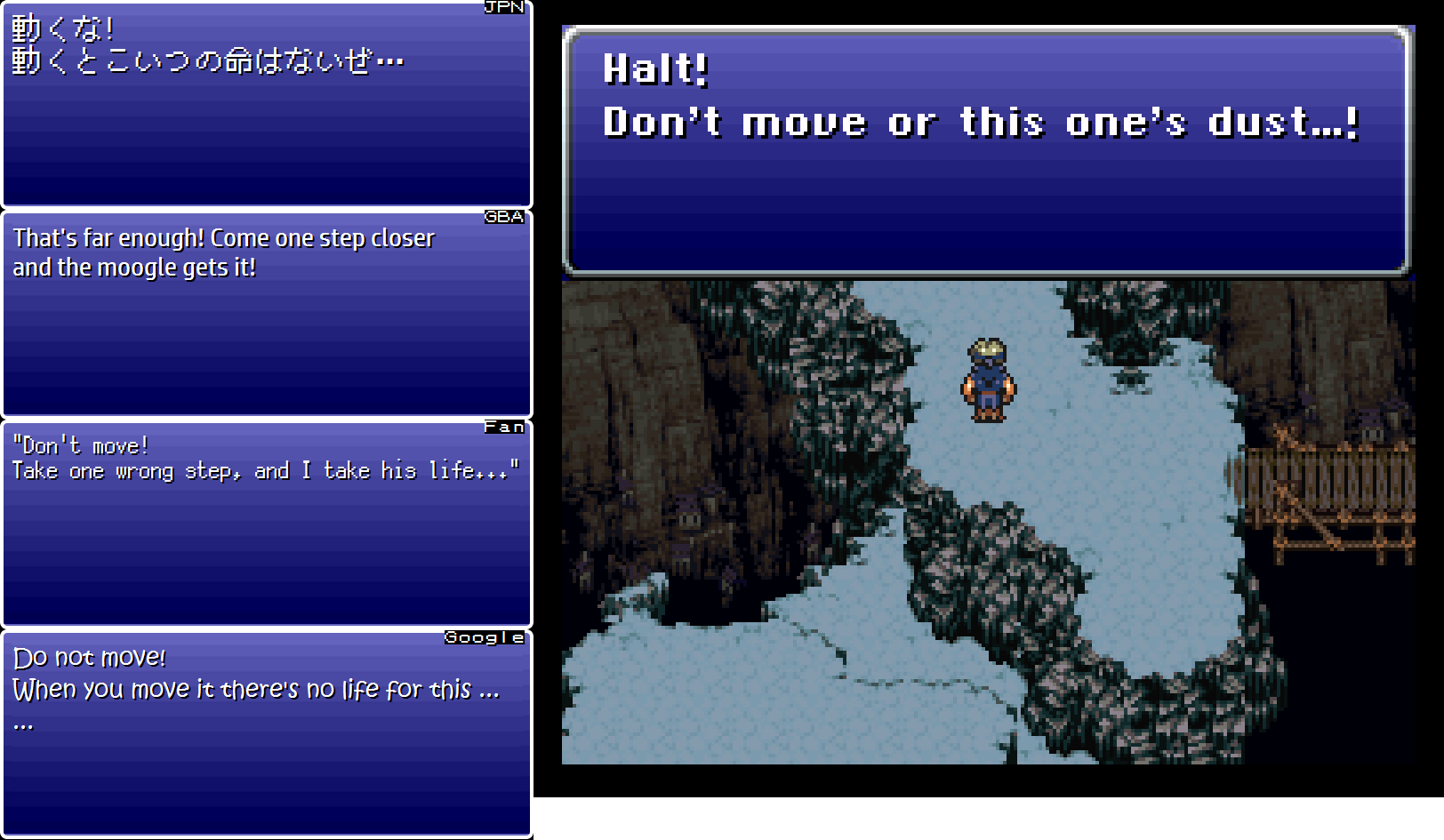
In Japanese, a wolf character threatens to take Mog’s life. In the Super NES translation, this was phrased as “Don’t move or this one’s dust…!”. Although the Japanese version doesn’t use the actual words for “kill” or “die”, the odd English wording makes me think the Super NES translator was being extra careful to adhere to Nintendo of America’s content policies about death.
Meeting Mog
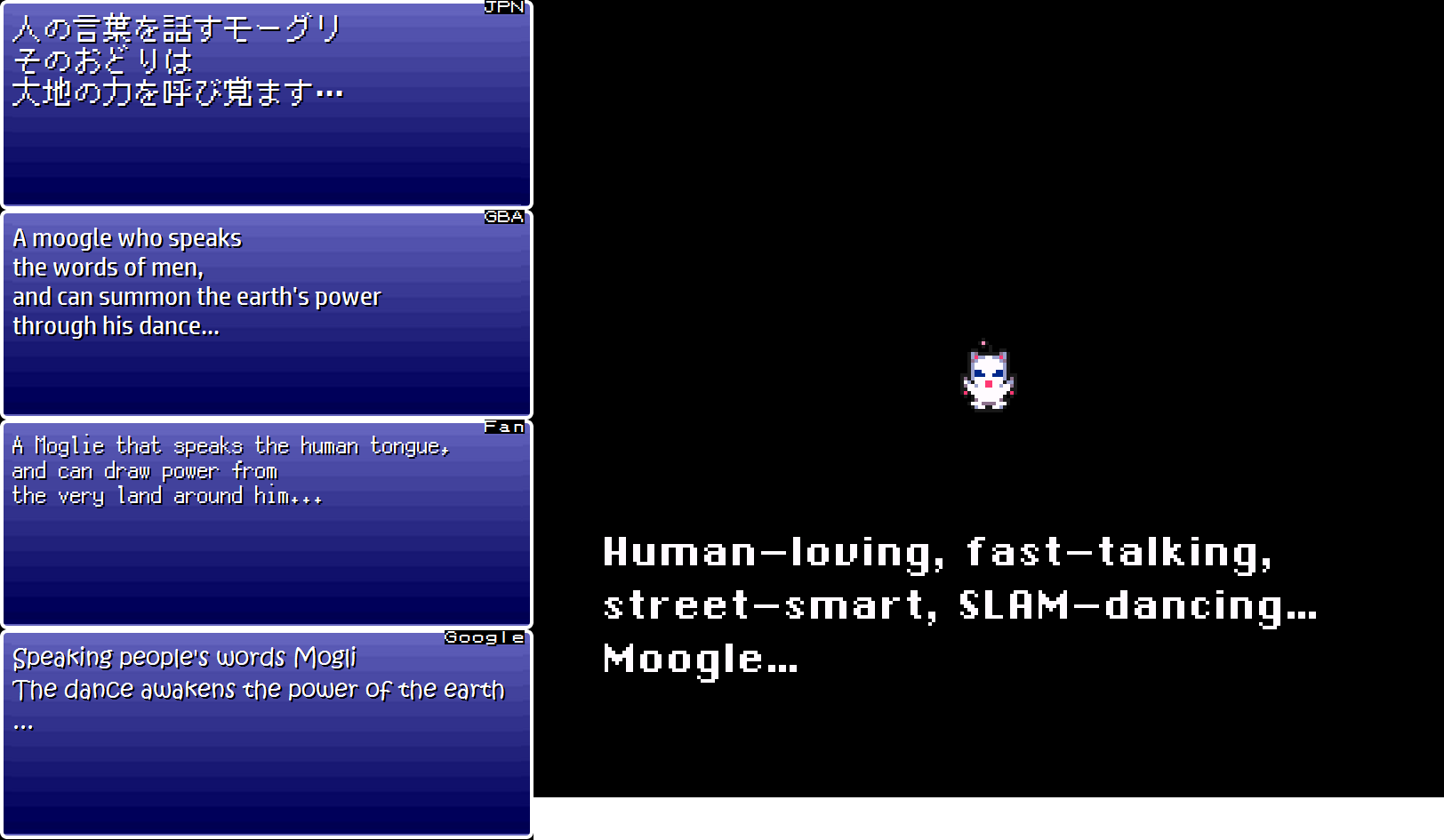
In Japanese, Mog’s introduction is something like:
A Mо̄guri who speaks human language and whose dances can summon the power of the earth…
The Super NES translation takes this in a very different direction, though:
Human-loving, fast-talking, street-smart, SLAM-dancing… Moogle…
This new version definitely gives him much more attitude and personality than the original text. For some reason I always saw Mog as a “90s character with attitude” that stood out compared to everyone else, but I guess that was because of this Super NES translation change. That, and the way Mog was portrayed in all the North American marketing media:
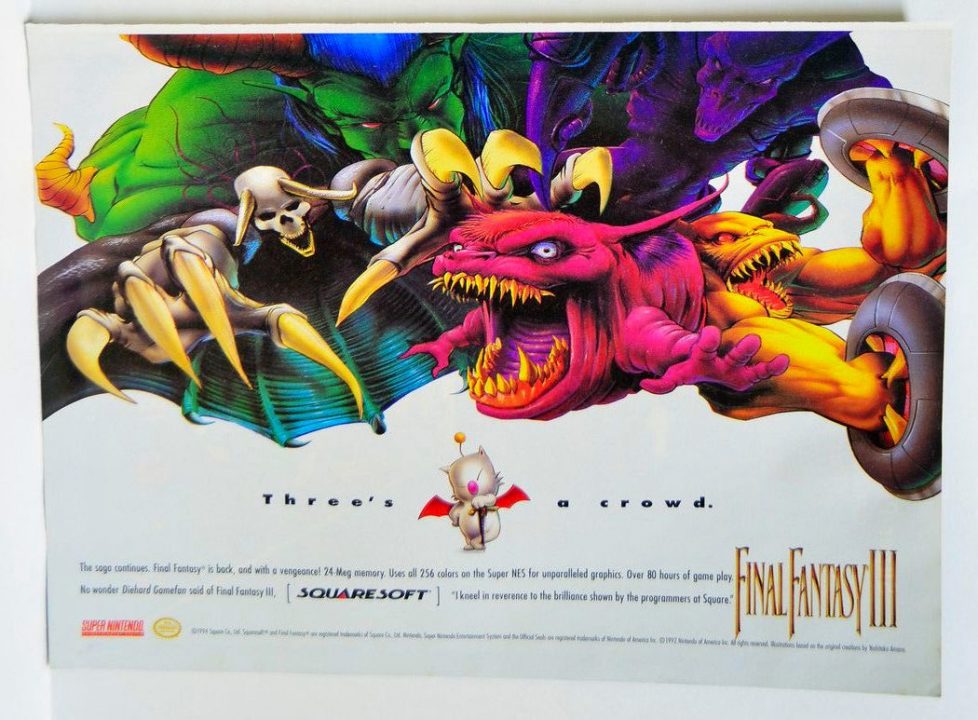
All of this attention centered around Mog gave the impression that he’d be an up-and-front character who oozes personality. But now that I’m looking at the scripts side-by-side and looking at the bigger picture in general, Mog feels like a pretty normal character in Japanese. He doesn’t have any “fast-talking, street-smart, SLAM-dancing” attitude or personality from what I can tell so far. He hasn’t really had much dialogue so far, but just for reference, he uses the boyish pronoun boku in Japanese.
Also, for some reason, this whole character change reminds me of how “Poochie the Dog” got invented:
Mog’s attitude injection also feels a lot like when Nintendo of America injected 90s attitude into Master Belch-related text in EarthBound the following year.
Anyway, the GBA translation undoes all of the Mog-has-attitude stuff: his in-game introduction is now properly translated and he’s no longer used as a hip mascot. The fan translation also drops the SNES translation for a more faithful translation of the original text.
Crazy Old Ramuh
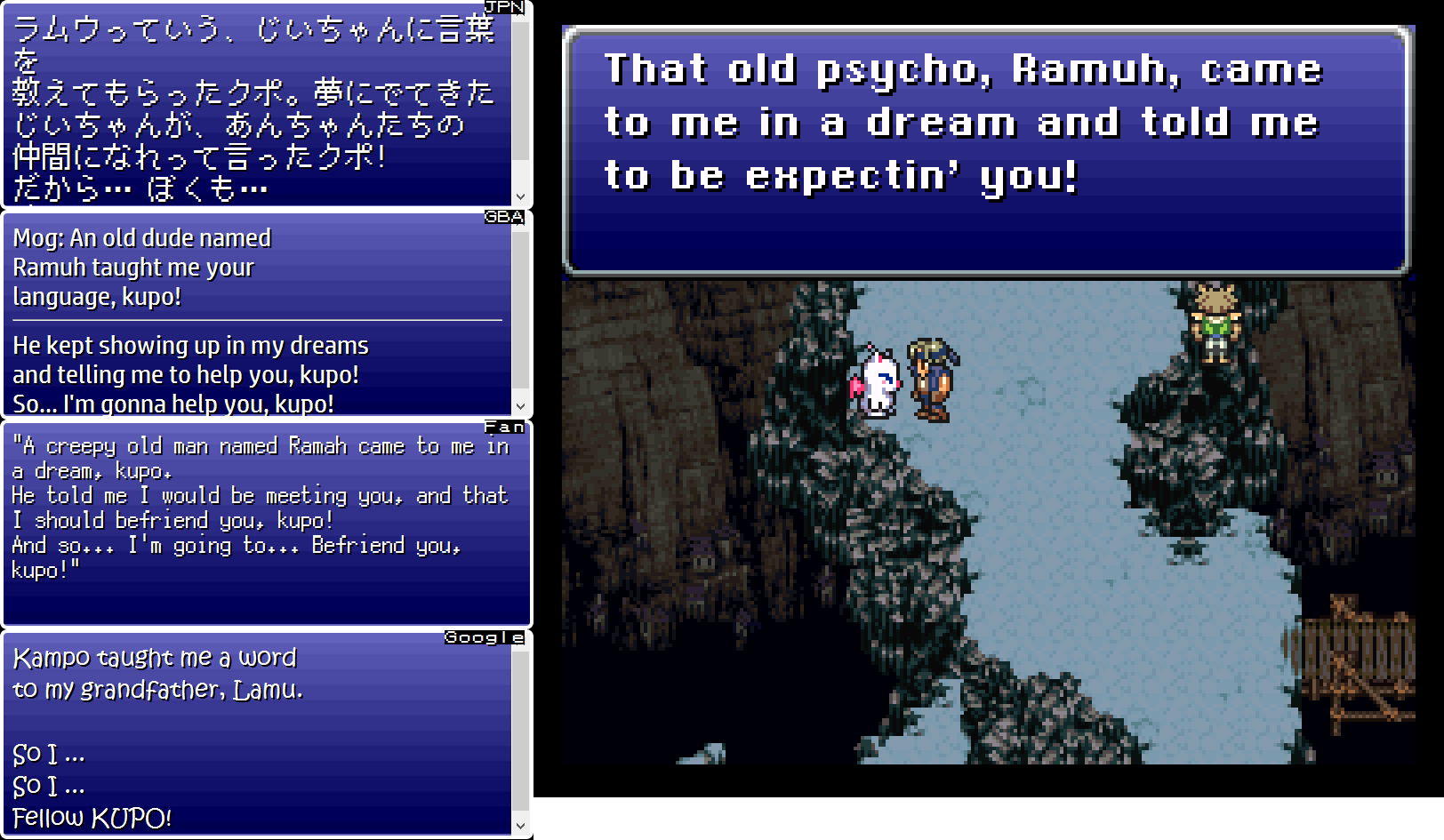
In the Super NES translation, Mog calls Ramuh an “old psycho”. The original Japanese text had nothing of the sort though – he just calls Ramuh something like “old man” or “old guy”. The GBA translation undoes this change, while the fan translation rephrases the “old psycho” part of the Super NES line into “creepy old man”.
Also, the Super NES translation seems to have removed some instances of the word “kupo”, but the GBA and fan translations put them back in. It’s interesting, because the Super NES translation actually adds a creative “kupo” by saying “Thankupo!” at one point in this scene when no “kupo” existed in the original text.
Love Vomit
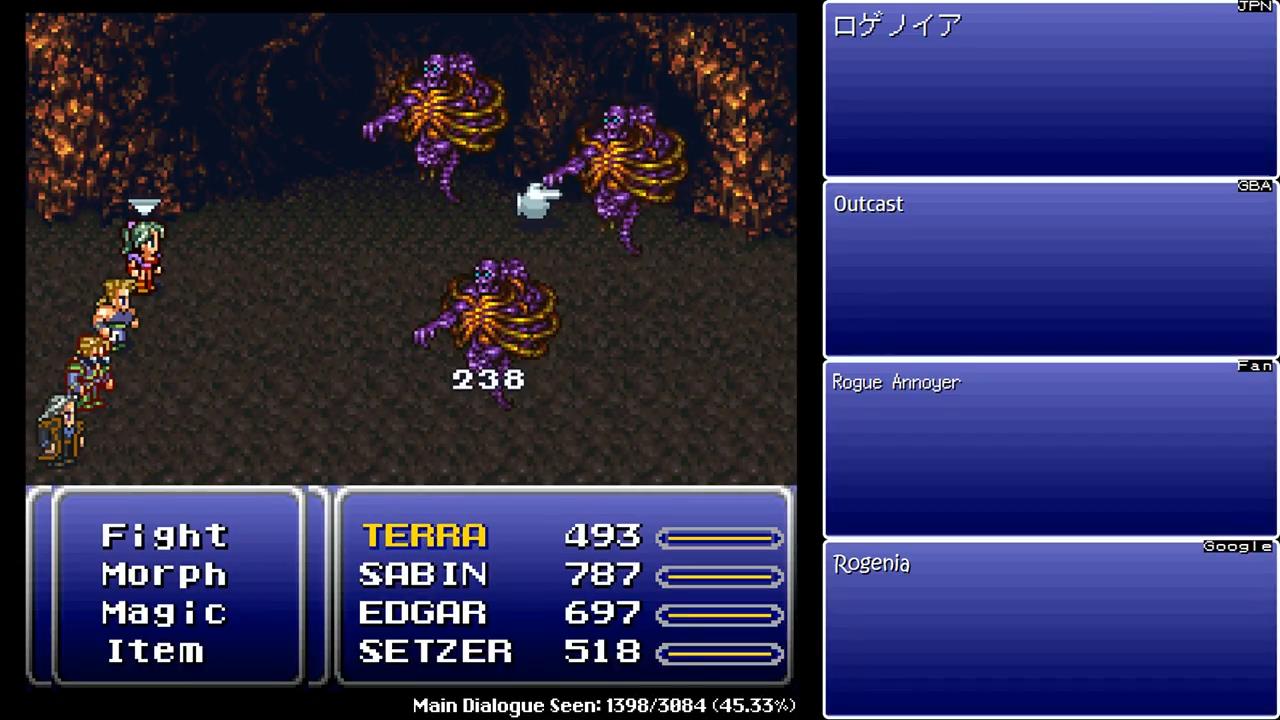
During the stream, I pointed out that I had no idea what these creepy exoskeleton monsters are supposed to be called in Japanese. They’re known as ロゲノイア (rogenoia), which strikes me as something from Latin or biology or weird old mythology.
After a while, some chatters pointed out that the name is actually a backwards name. With this in mind, the Japanese name would be アイノゲロ (ainogero), which means something like “vomit of love”. Is this really the only reason for the name? I have no idea personally, but I’ve seen Japanese fans joke about it and share memories of when they discovered how it reads backwards.
In any case, the enemy was renamed “Ing” in the Super NES translation. Apparently this is a reference to something mythological called “Yng” or “Yngvi”, but I haven’t looked into it myself. The GBA translation changed the name to “Outcast”, and the fan translation tried valiantly to find meaning in rogenoia and eventually got “Rogue Annoyer” out of it.
You don’t hear about it too often in interviews and such, but man, enemy name translation is tough!
Magicite Handling
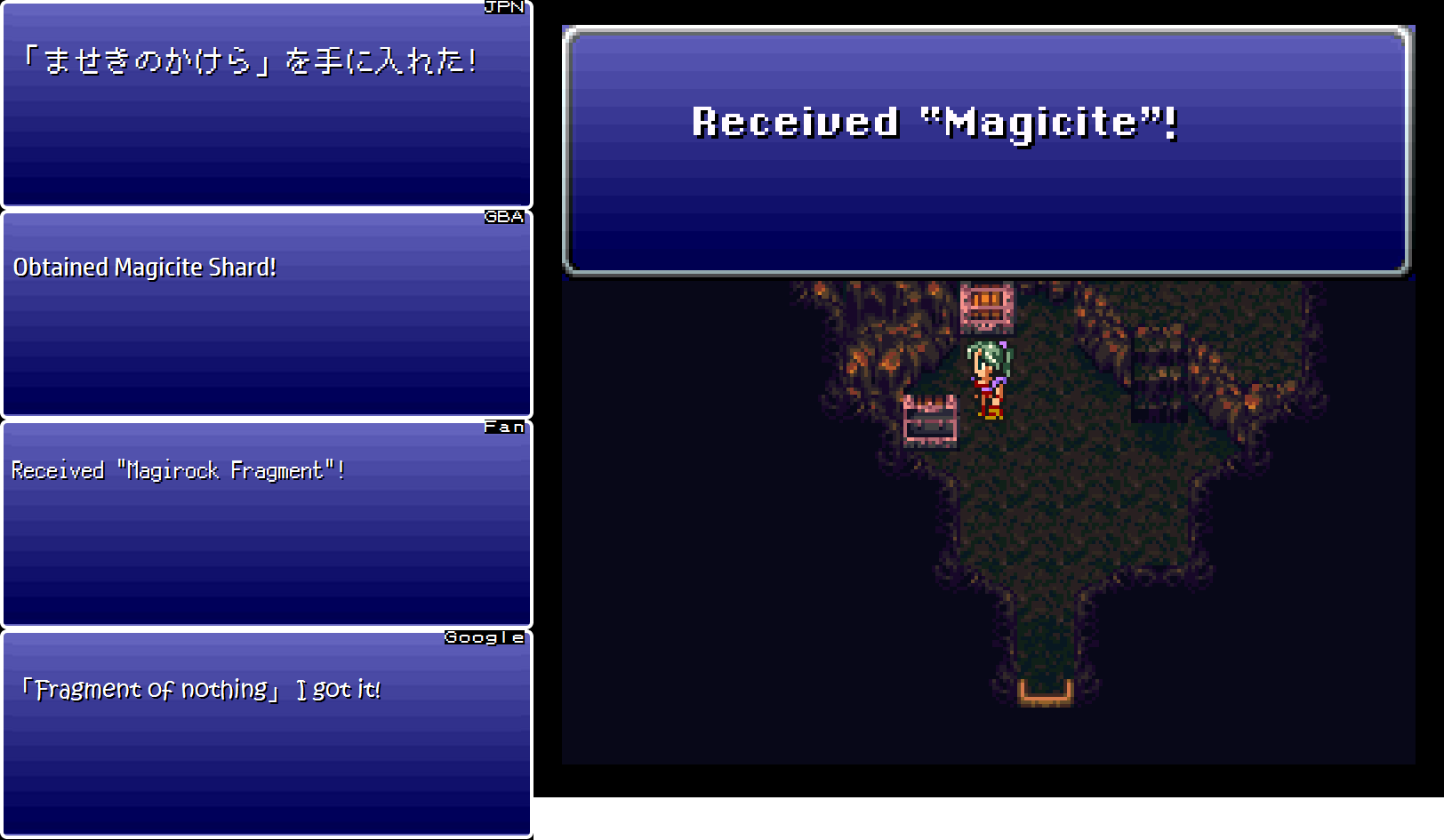
In a previous stream I noted that the Super NES translation improperly referred to full pieces of Magicite as “Magicite shards” in the main story text. Here, we discovered that there are actual items called “Magicite” that you can get from treasure chests and special events – except these are actually called “Magicite shards” in Japanese.
Basically, the Super NES translation messed up and got things backwards. Of course, I can understand why the item is simply called “Magicite” – all item names have strict length limits in the Super NES version. Still, I feel “Mag.Shard” or something similar would’ve worked. In the end it’s not a big deal, but it’s a quiet inconsistency I never noticed before.
Atma Weapon
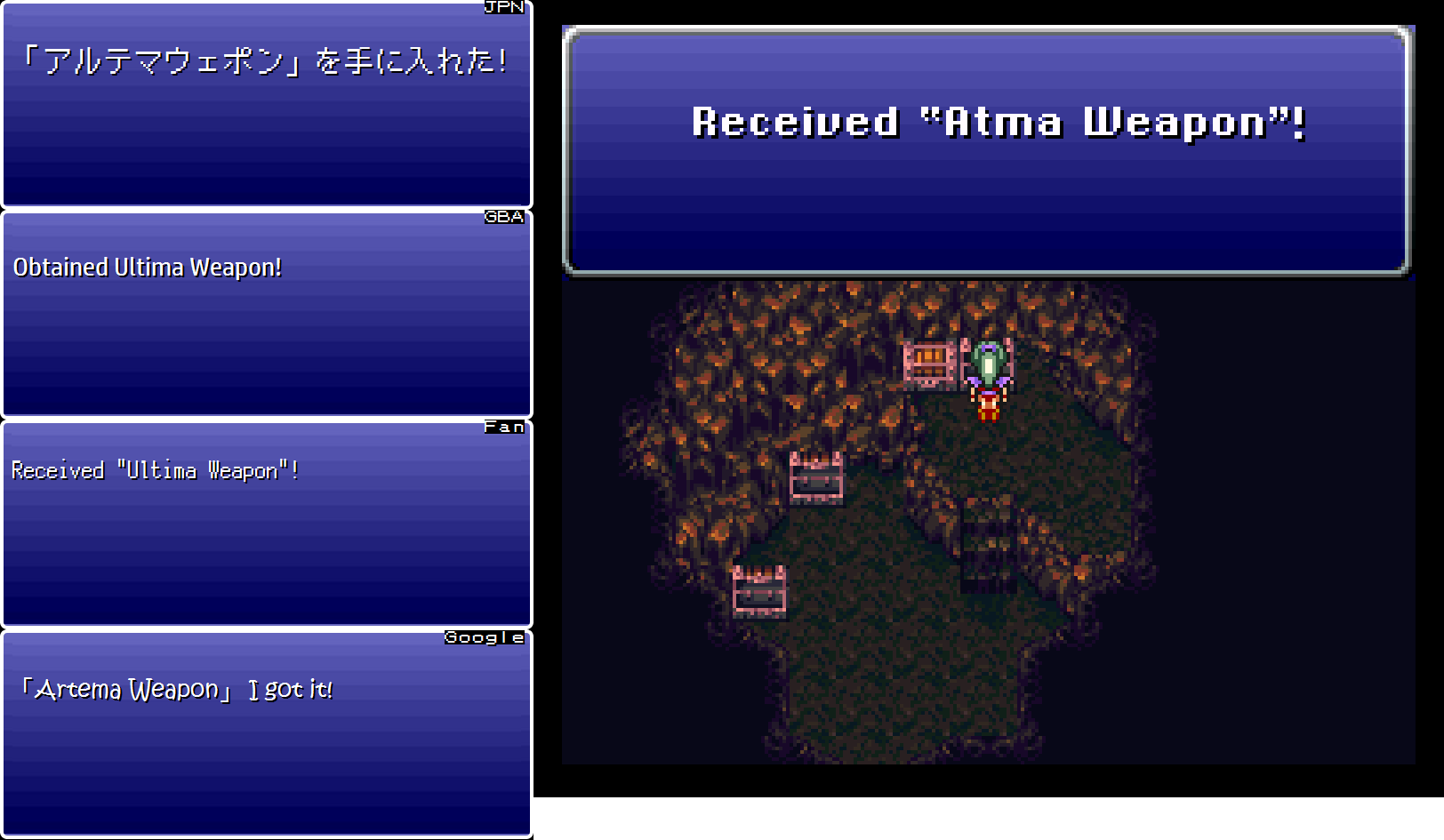
At one point in the game, you learn that there are two legendary weapons in the world – one is a special sword, and another is a living weapon. Both weapons go by the same name.
In Japanese, these weapons are called アルテマウェポン (arutema wepon). The second part is just the English word for “weapon”, but what’s the arutema part? At first glance, it’s not really obvious what it’s supposed to mean. My own translator instinct would probably suggest “Artema” or “Altema” at first. What’s more, a quick online search shows that both of these spellings are used in a variety of situations, so they’re within the realm of plausibility in this situation too:
The problem is that arutema is intended as neither of these words, at least in the context of Final Fantasy VI. Instead, it’s a phonetic attempt at how we would say “Ultima” in English. As we’ve previously seen here, there are lots of problems with As and Us, Ls and Rs, and Is and Es whenever a word goes from English into Japanese or the other way around.
So, because of this phonetic craziness, it isn’t 100% immediately obvious that arutema is supposed to be “Ultima”. In fact, games in the Ultima series use a very different Japanese spelling: ウルティマ (urutima).
All of this is to say that spelling gets complicated whenever an English word gets transformed into Japanese, but it gets even crazier when that Japanese word gets transformed back into English.
As a result of all this confusion, the Final Fantasy VI Super NES translator misunderstood the name entirely and improperly called it “Atma”. Yet, the translator did properly translate the word elsewhere in the game:
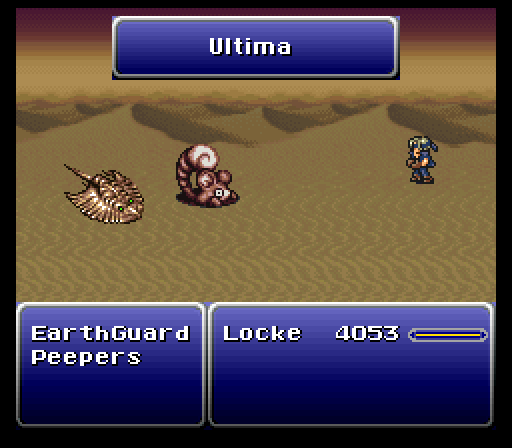
Basically, the Super NES translation features a weird blend of incorrect translations and inconsistent translations here. Luckily, both the GBA translation and the fan translation fix this ultimate problem.
Kefka’s Plot
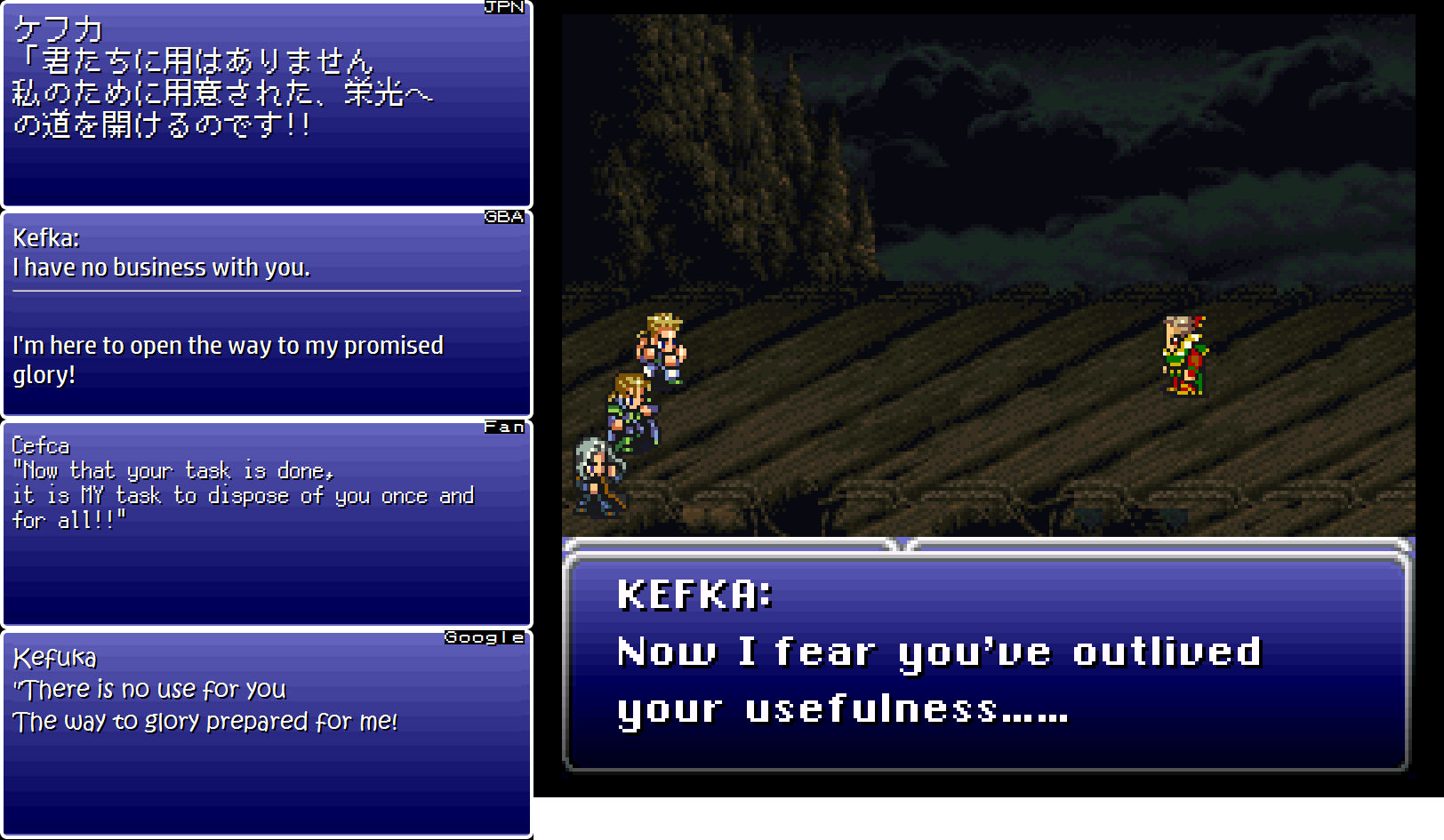
Kefka shows up to cause trouble. At one point, he mentions how he tricked the heroes into doing exactly what he wanted and that he has no more use for them anymore.
After this, Kefka mentions that he’s about to follow the path to glory that has been prepared for him. This line was dropped entirely from the Super NES translation, so now the scene flows a little strangely:
Kefka: Now I fear you’ve outlived your usefulness……
(The heroes get ready for a battle): “You’d better think again, Kefka!”
The GBA translation fixes this problem by putting the missing line back into the scene:
Kefka: I have no business with you. I’m here to open the way to my promised glory!
(The heroes get ready for a battle): You’d better think again, Kefka!
The fan translation doesn’t fix the mistake present in the Super NES translation, though. Instead, it seems to be a mistranslation of Kefka’s first line coupled with a fanfic-esque rewrite that adds text out of nowhere.
Terrified Citizens
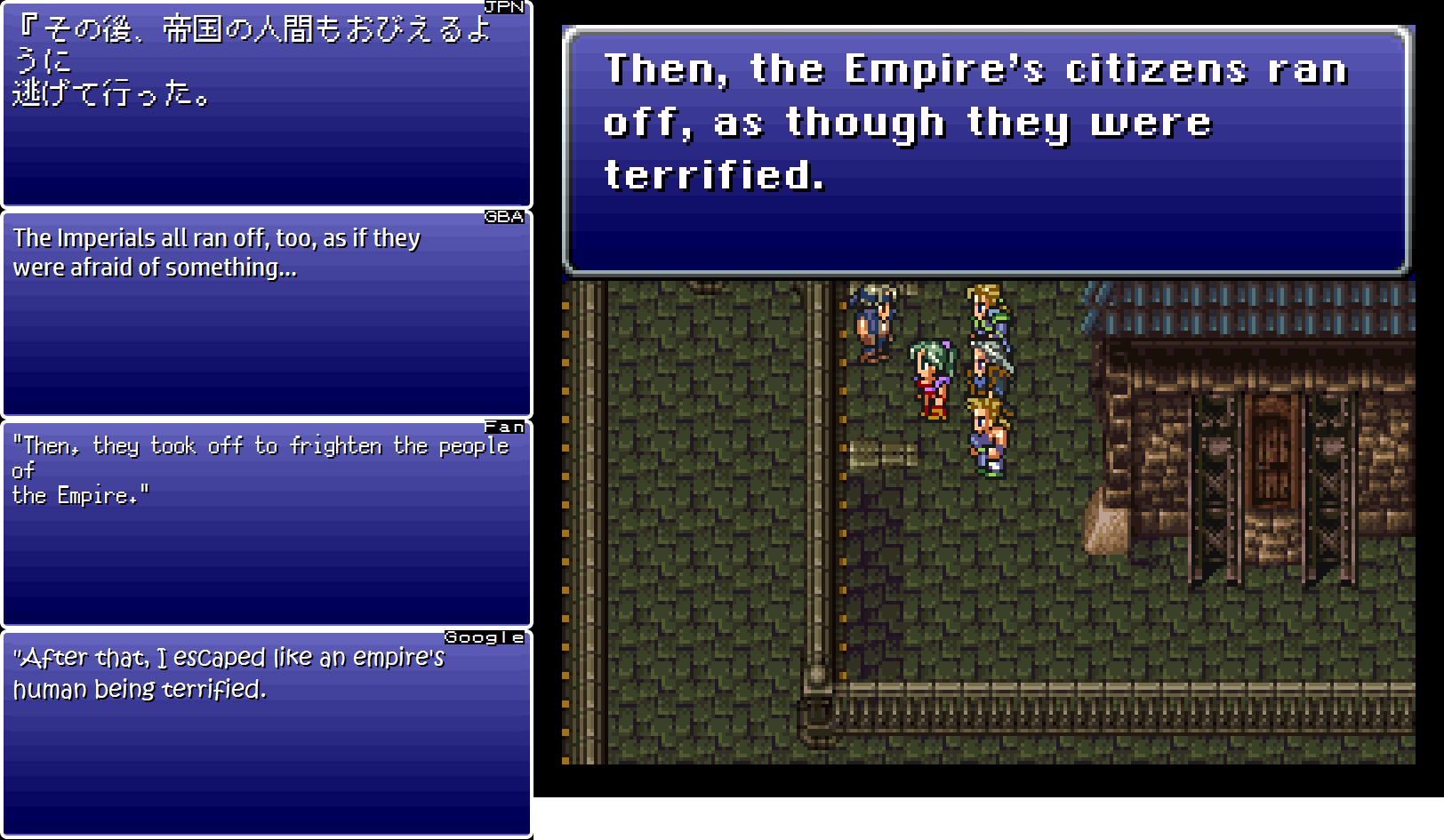
One of the main characters explains what happened after the Espers broke out into the human world. In Japanese, this explanation includes a line that says “Afterward, the people of the Empire ran away as if afraid.”
The Super NES and GBA translation both get this detail correct, but the fan translator wasn’t fully accustomed to the grammar involved, so the end result was quite different:
Then, they took off to frighten the people of the Empire.
I can see why this mistake happened, though – it’s a combination of multiple grammar misunderstandings you might see from a student with a couple semesters of Japanese under their belt.
The Power to Help
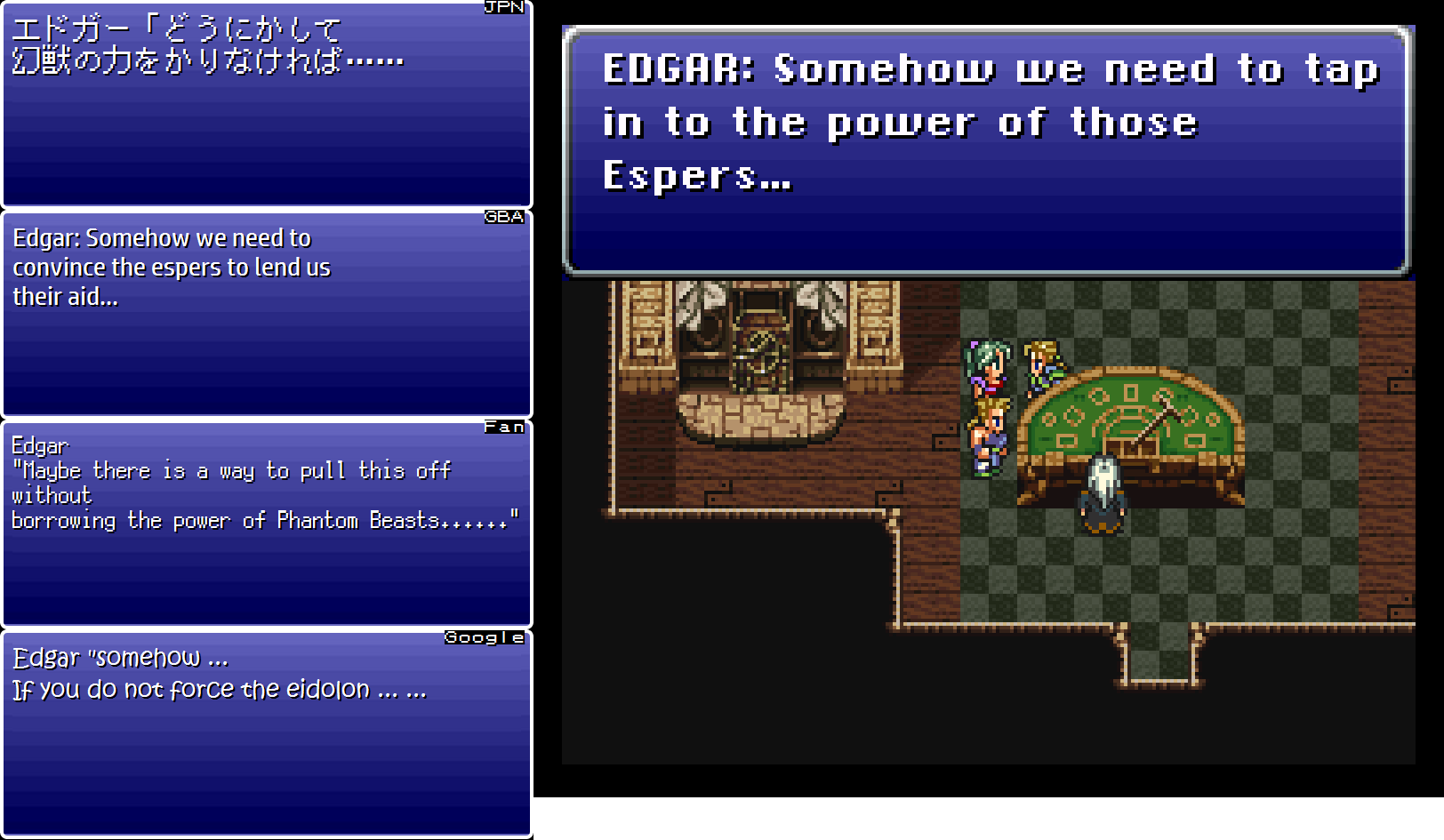
I mentioned it during the stream, but this line involves the Japanese word 力 (chikara), which is often translated as “power” or “strength” or “energy”. But in many contexts you can consider it to mean “help” or “assistance” instead. There are lots of Japanese phrases that use chikara this way:
- 力になる (chikara ni naru) literally translates as “to be/become/act as someone’s power” but functionally means “to help someone” or “to assist someone”
- 力を貸す (chikara o kasu) literally translates as “to lend power” but functionally means “to give help” or “to lend a hand”
- 力を借りる (chikara o kariru) literally translates as “to borrow power” but functionally means “to receive help” or “to get assistance from”
These are pretty common phrases, but translators-in-training aren’t always familiar with them, so it’s common to see amateur translations stick with the literal meanings rather than the functional meanings. In fact, we see that this fan translator uses “borrowing their power” in this line about Espers. Even the Super NES translator falls into the same trap by using the phrase “tap in to the power of those Espers”.
Of course, it’s an understandable mistake in rare situations like this that happen to involve special powers. Still, if you stop to think about it, the story at this point in time is basically “the Empire sees Espers as disposable resources, but the good guys are against that”, right? But because the Super NES and fan translators misunderstood the Japanese phrasing, the good guys now view the Espers as a resource too.
In contrast, the GBA translation fixes this mistake by properly translating Edgar’s phrase. Now, instead of viewing the Espers as some sort of resource to be used as suggested by the Super NES translation, Edgar sees the Espers as living, thinking beings and even hopes to work alongside them.
Between this line and other tricky lines we’ve seen before, it’s clear the GBA script was handled by someone with a lot of experience in this field.
Something Happened
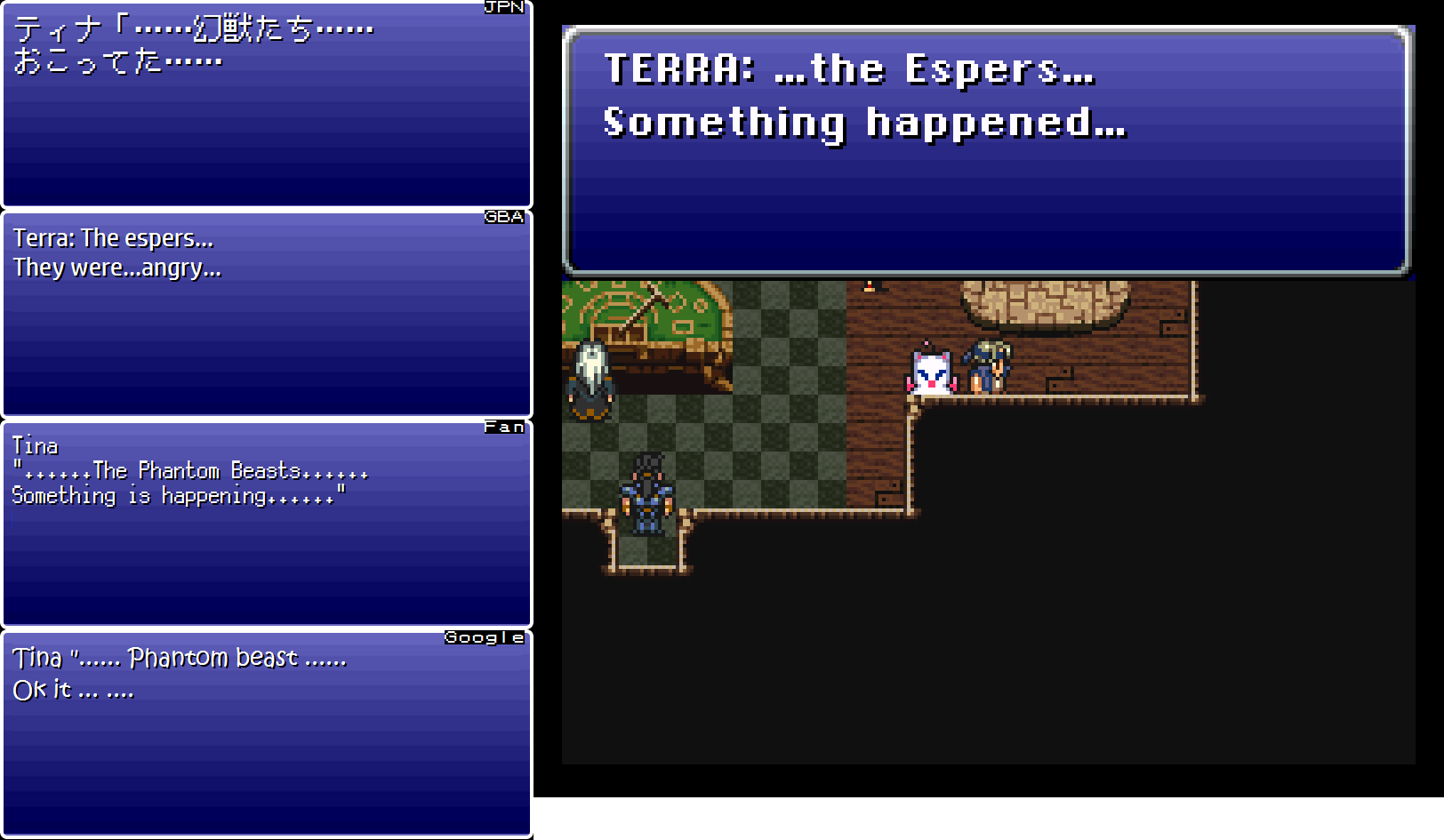
In the Japanese version of this line, Terra says:
…The Espers… were angry…
There’s a translation trap here, though: the word おこる (okoru) has many different meanings, including “to be angry” and “to happen”. Usually it’s clear which meaning is intended based on context and other factors, but the Super NES translator fell for the trap and mistranslated it as “something happened” instead.
The GBA translation handles the word correctly, while the fan translation is either a rephrasing of the Super NES line or another instance of someone making the same translation mistake.
Also, given the full context, it seems really weird for Terra to say “Something happened…” here. She was literally right there when the “something” happened, as were a bunch of other party members.
Crazy Old Banon
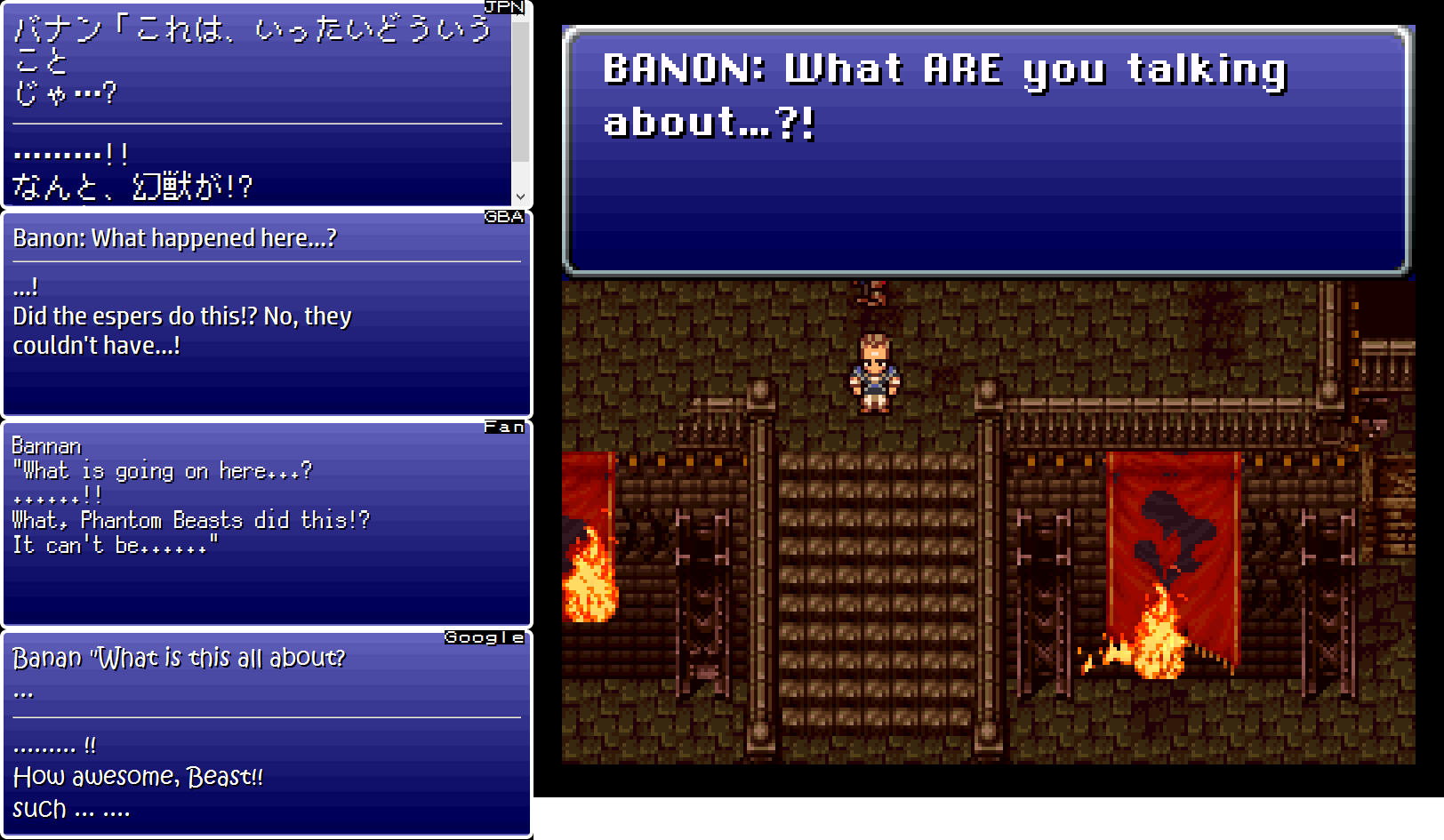
Banon and the Returners are now in the imperial capital of Vector. Banon’s text in the Super NES version is incorrectly translated due to lack of context and an incomplete sentence:
| Japanese Version (basic translation) | Super NES Translation |
| What in the world happened here…? | What ARE you talking about…?! |
| ……!! | ……!! |
| What?! The Espers did this?! That can’t be…! | Talking with…Espers…? |
Both the GBA and fan translations fix this mistranslation.
War Crimes
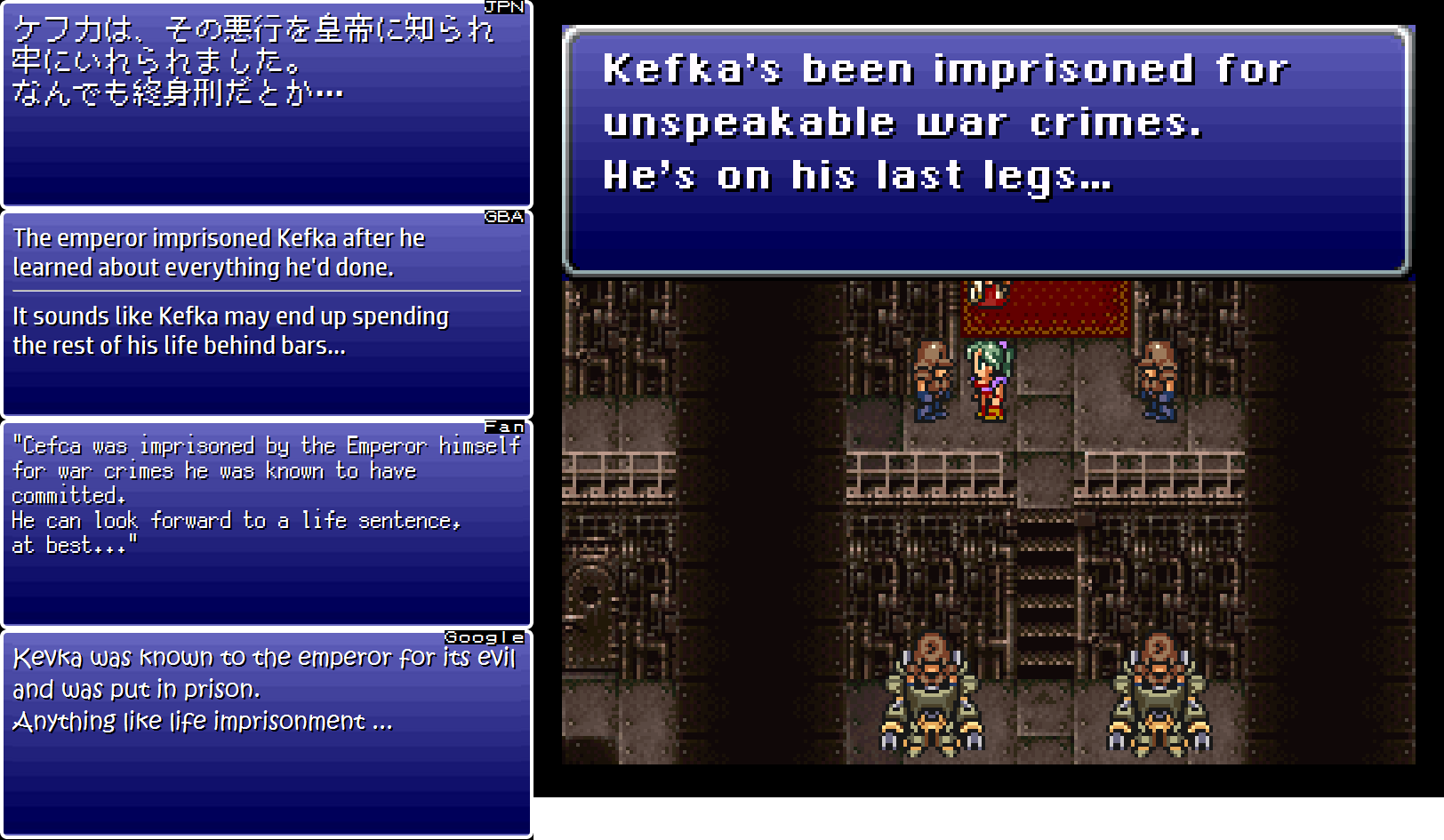
One of the soldiers in Vector talks about Kefka. In Japanese, he says:
Kefka was imprisoned once the emperor learned of his evil deeds. Word has it he’s been given a life sentence…
The Super NES translation changes things a bit:
Kefka’s been imprisoned for unspeakable war crimes. He’s on his last legs…
The fact that the emperor himself imprisoned Kefka has been dropped, and the part about getting a life sentence was replaced with something else entirely. I’m not quite sure why the change to “he’s on his last legs” was made, though.
Glossing Over History
In Japanese, Cid says:
When the (the Espers) learned that their comrades had all been slaughtered/killed, they tore up the town and left.
The Super NES translation replaces the “killed” part with “perished” to avoid Nintendo of America’s policy against such content. But the change also unintentionally takes the blame off of the Empire. Of course, if you follow the story closely you know how they perished, so it’s not a complete change.
Strangely, the GBA translation also keeps the violent talk out of the script by using “none of them were alive”. Even the fan translation goes with “they were all dead”. Only the Google translation properly explains what happened to the Espers, which also explains why the Espers tore up Vector specifically.
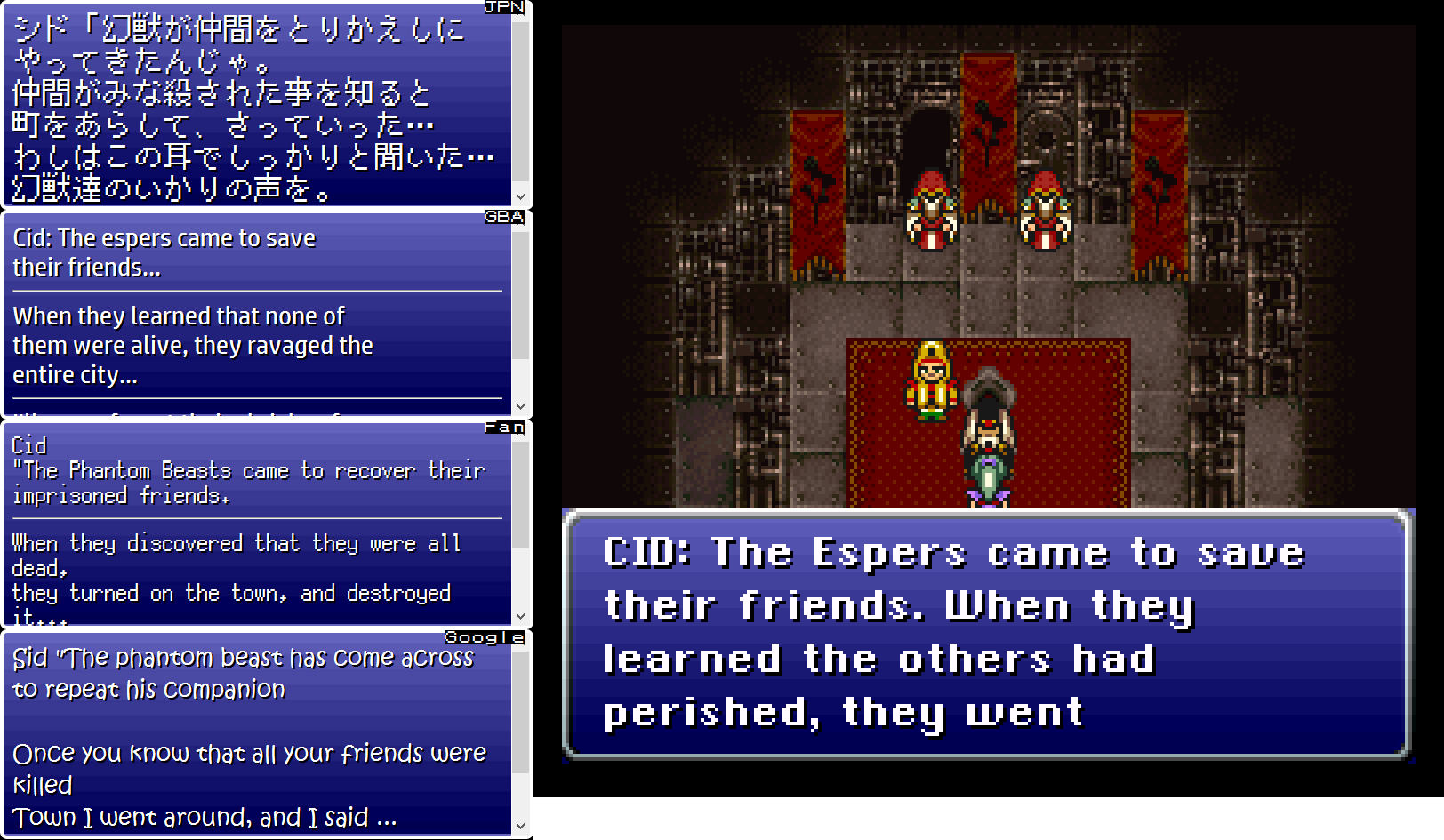
Sitting Down
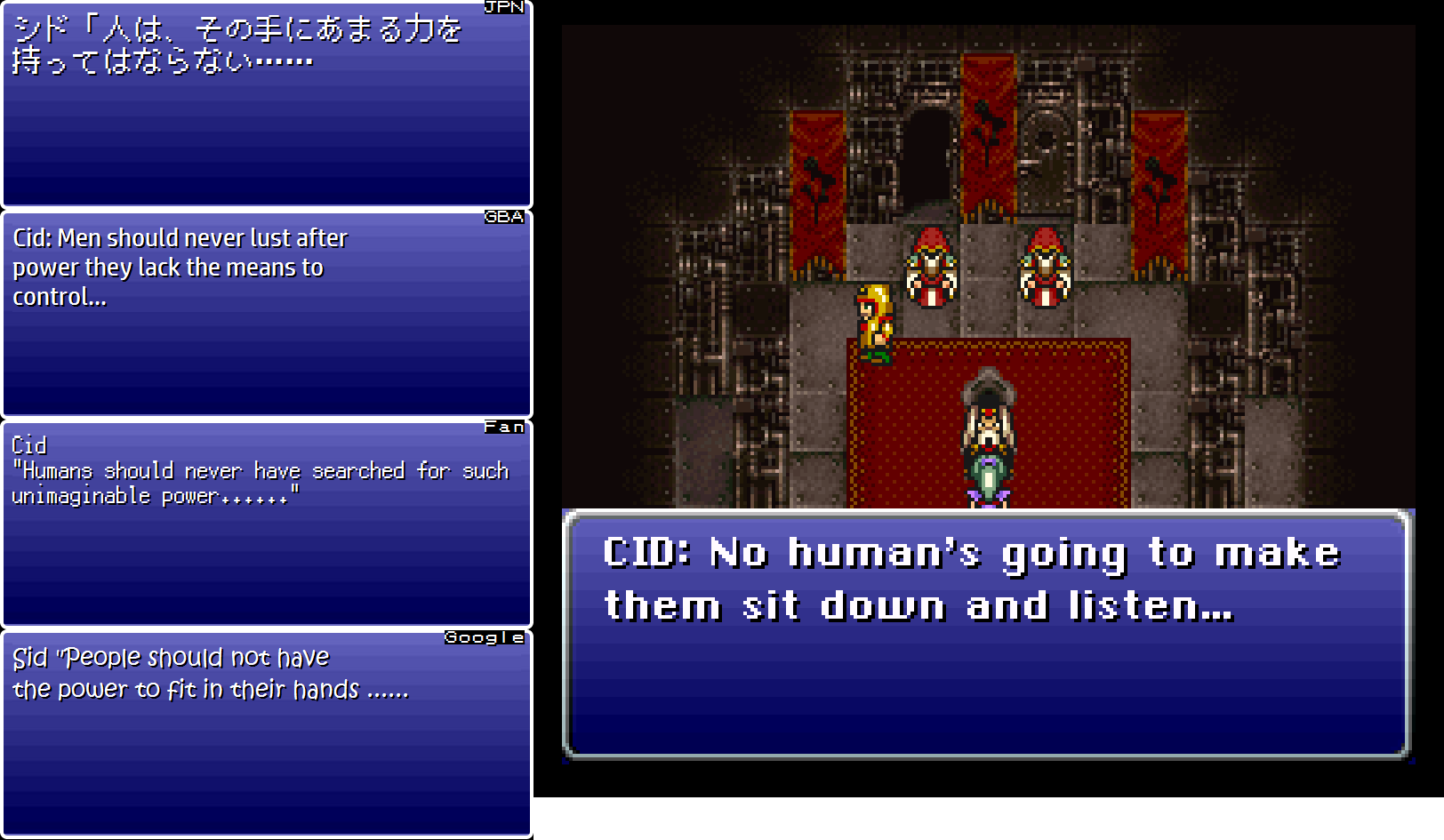
In Japanese, Cid says something like:
Humans should never possess power that is too much for them to control.
For some reason, this line is very different in the Super NES translation:
No human’s going to make them sit down and listen…
I don’t know why this line wound up so different in translation. Either it’s a completely made-up line or a really heavy mistranslation.
Banquet Toast
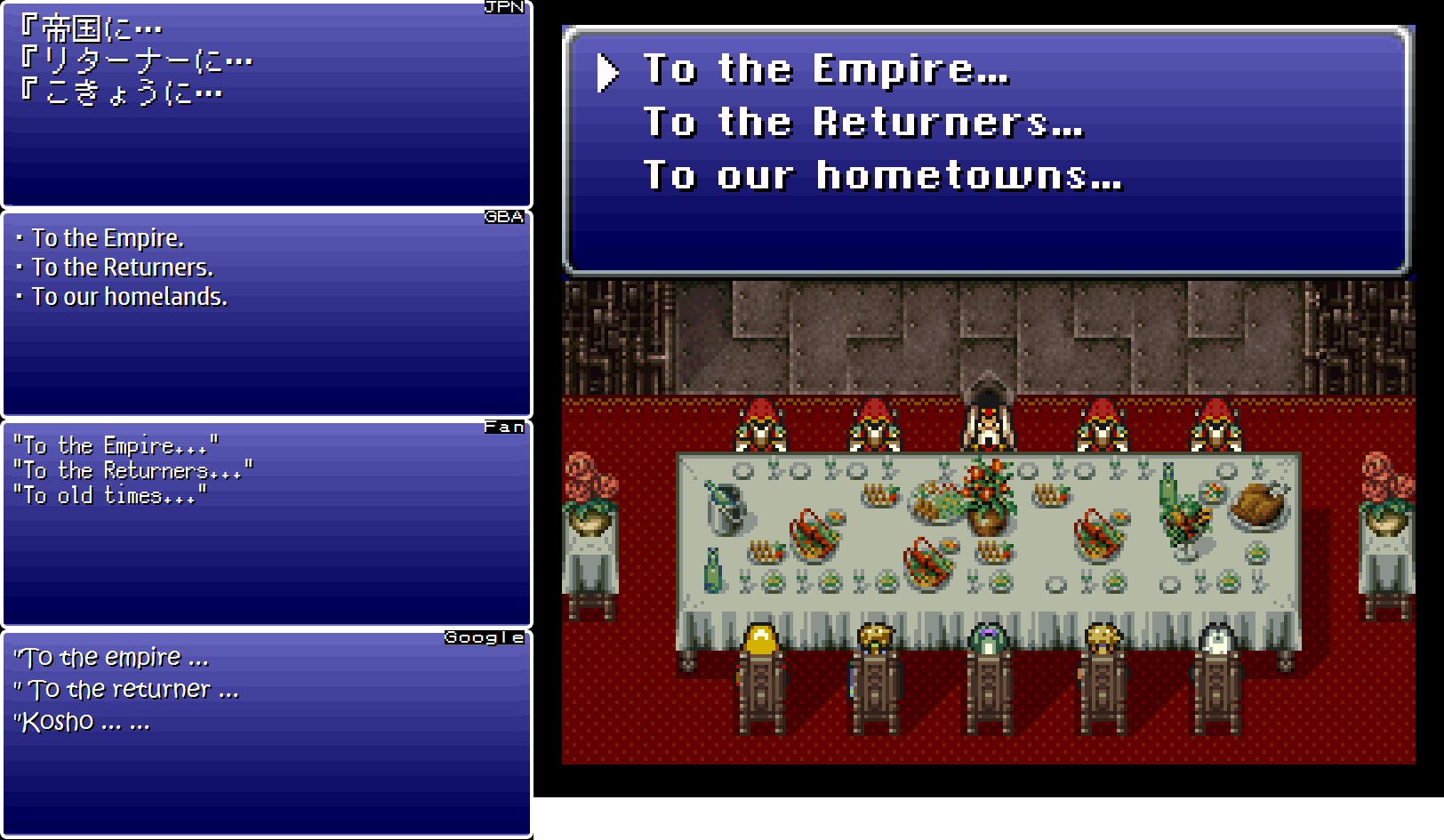
During the banquet with the emperor, you get to choose a bunch of questions and answers that lead to slightly different results by the end of the event. One of the early choices is about what everyone should give a toast to.
In Japanese, the three options are:
- To the Empire…
- To the Returners…
- To our homelands…
The Super NES and GBA translations get this right, but the fan translation changes the third option:
- To the Empire…
- To the Returners…
- To old times…
I can’t tell if this is a mistranslation or not… but if it isn’t, then I don’t know what it is. I have no idea how こきょう (kokyō) could end up mistranslated as “old times”.
Life or Death
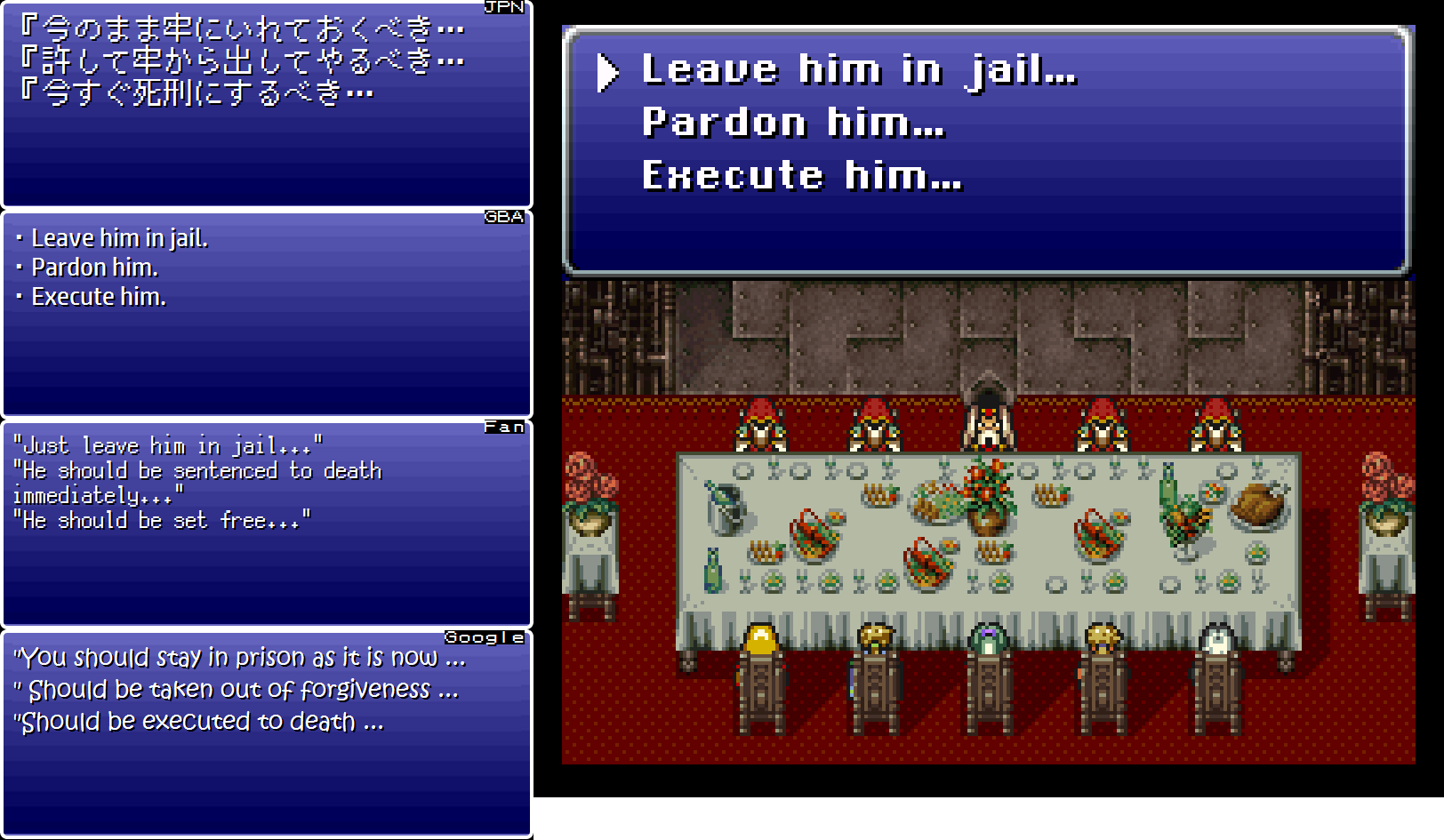
Later in the banquet, the emperor asks what should be done with Kefka. The three options available in Japanese are:
- Leave him in jail…
- Forgive him and let him out of jail…
- Execute him immediately…
Both the Super NES and GBA translations handle this fine. In fact, I’m surprised the Super NES translation leaves the execution part in!
The fan translation does something different, though:
- Just leave him in jail…
- He should be sentenced to death immediately…
- He should be set free…
For some reason the second and third options have been swapped. I’m not fully familiar with the banquet’s internal points system so I don’t know if this line swap makes a difference, but it’s still a pretty crazy thing to get jumbled up.
Crescent Island
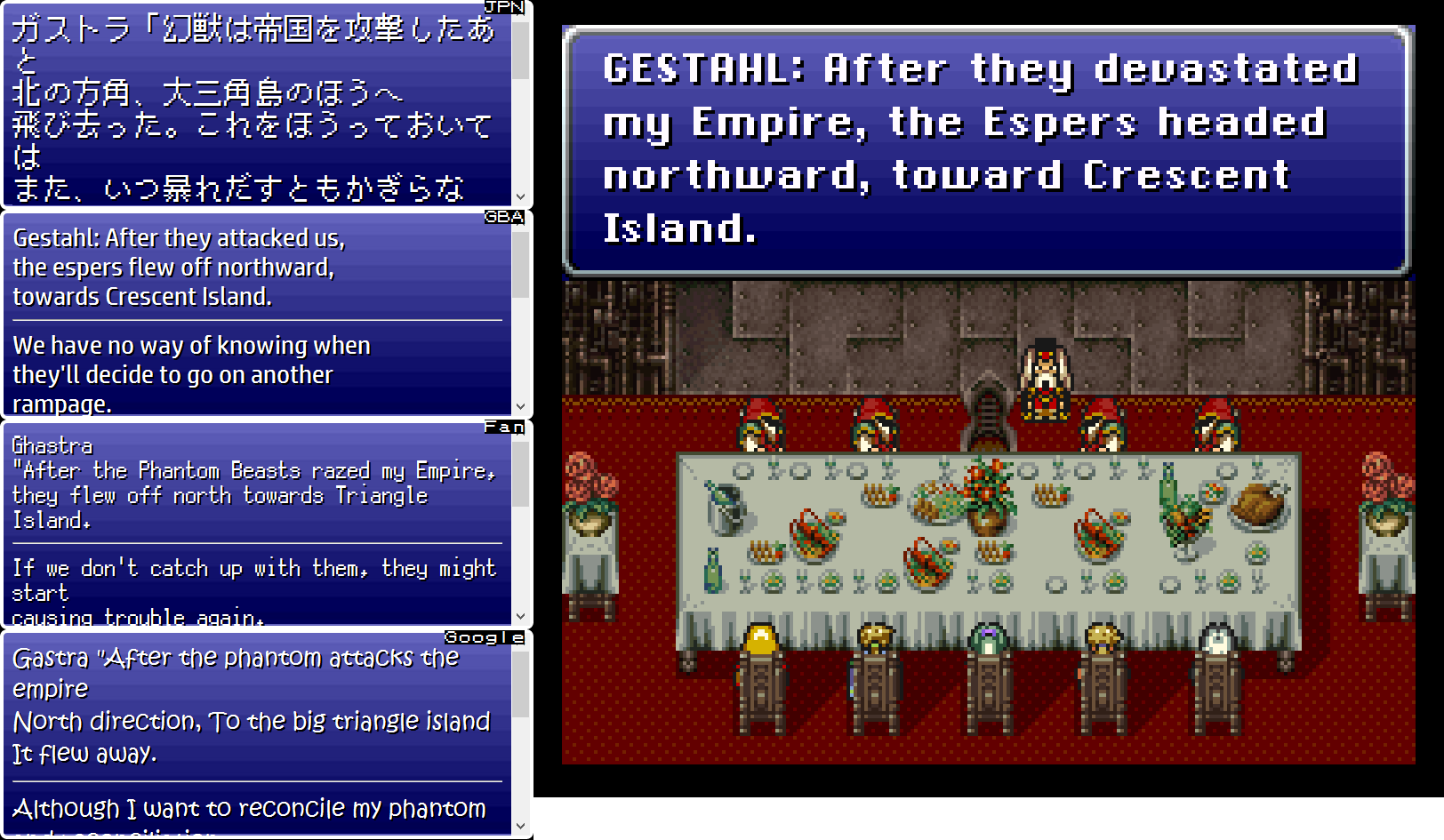
The next big destination is a place called “Big Triangle Island” or “Great Triangle Island” in Japanese. The Super NES translation gives it a different name, though: Crescent Island. The weird thing is that it’s not a crescent at all!
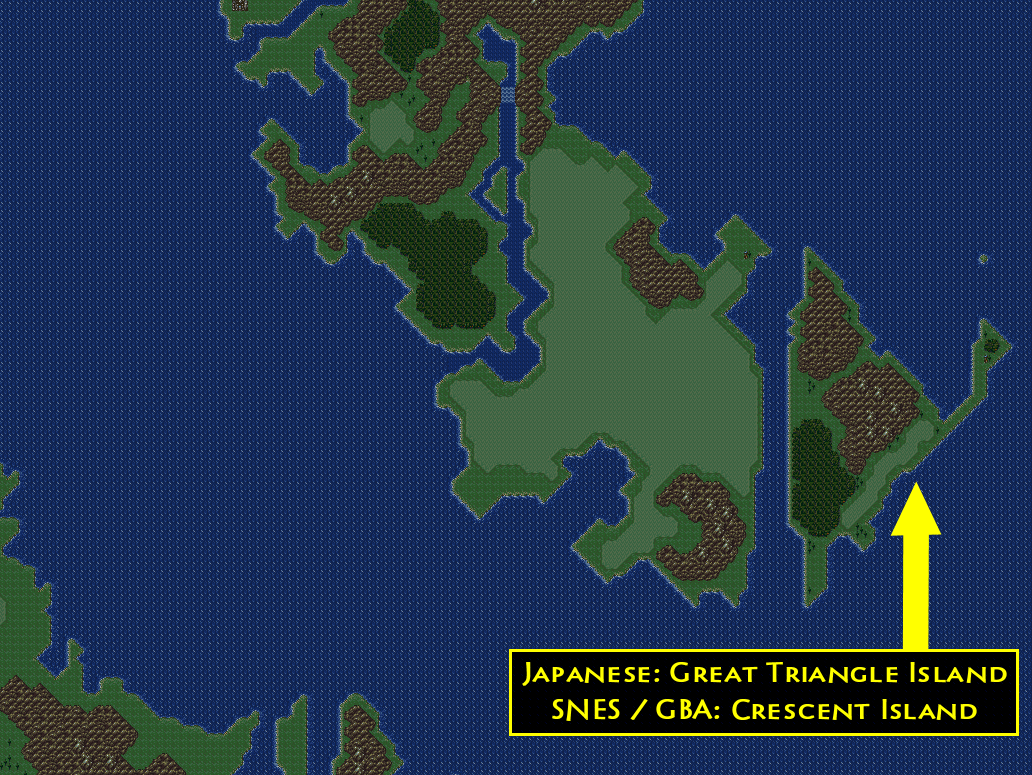
My best guess is that the Super NES translator was speeding through the script with no time to pause. The Japanese word for “crescent” is 三日月 (mikazuki) which literally means “three days moon”, and the word for “triangle” is 三角 (sankaku) which literally means “three corners”. Both words involve the number three and look kind of similar, plus there was already a place named after a crescent elsewhere in the script. So maybe the translator made some hasty assumptions and accidentally went with “Crescent Island”.
Anyway, whatever the cause of this weird name translation was, the GBA translation left it as “Crescent Island”. We’ve seen that many important names in the game were kept as-is between the Super NES and GBA translations, so this doesn’t come as too much of a surprise.
Incidentally, the official Japanese guides call it “Grand Triangle Island”, as we see here:
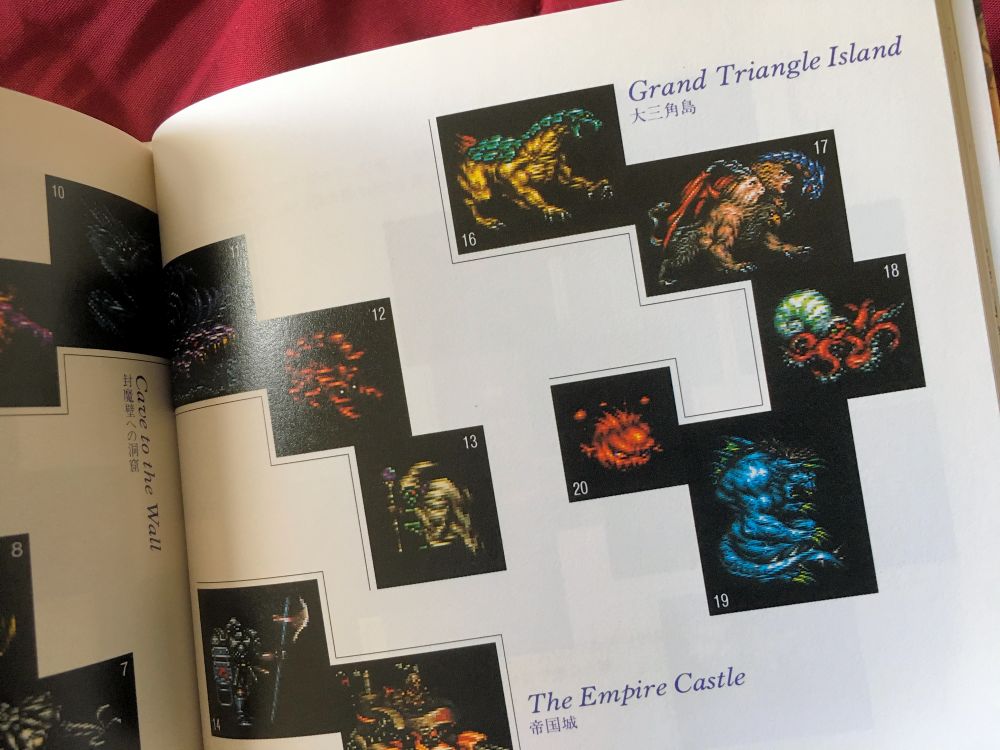
If you’re a fan, you’re probably about to say, “Wait, there already is a Triangle Island in the English versions!”. Indeed, the tiny northeastern island with weird creatures is known as “Triangle Island” in Japanese too. That’s why this one is called the “Grand Triangle Island”.
So, if you put all this info together, this means that “Grand Triangle Island” is a rare case of when the fan translation is more correct than the official translations, while Google is even better than all the others and gets it completely right!
Keeping Watch
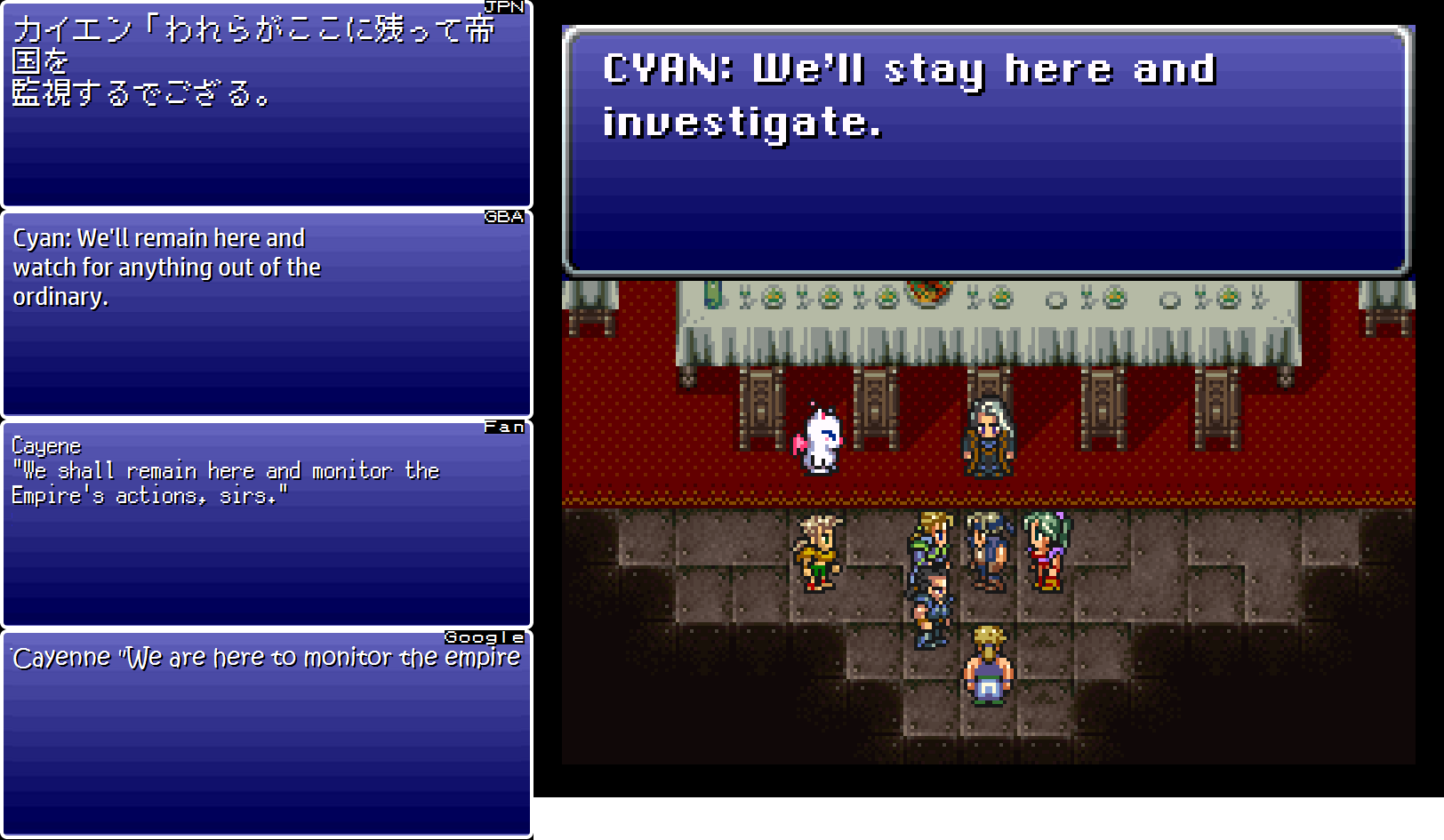
After the banquet ends and the Returners agree to team up with the Empire, the heroes still feel suspicious about the whole deal. In Japanese, they say that they’re going to keep an eye on the Empire while the main party goes out and does its thing.
This idea of the heroes watching the Empire and keeping an eye on the Empire is brought up in multiple places, but the Super NES translation mistranslates it all from the very start. Instead of keeping an eye on the Empire, the heroes now talk about investigating the Empire, breaking into the Empire, and other things that go beyond just watching.
When you think about it, why would they need to break into the Empire anyway? They literally just had a meal with the Emperor himself and got permission to run around the Imperial headquarters as they please!
The GBA translation fixes this series of subtle mistakes. The fan translation and the machine translation also correct the Super NES translation’s mistakes.
Familiar Smell
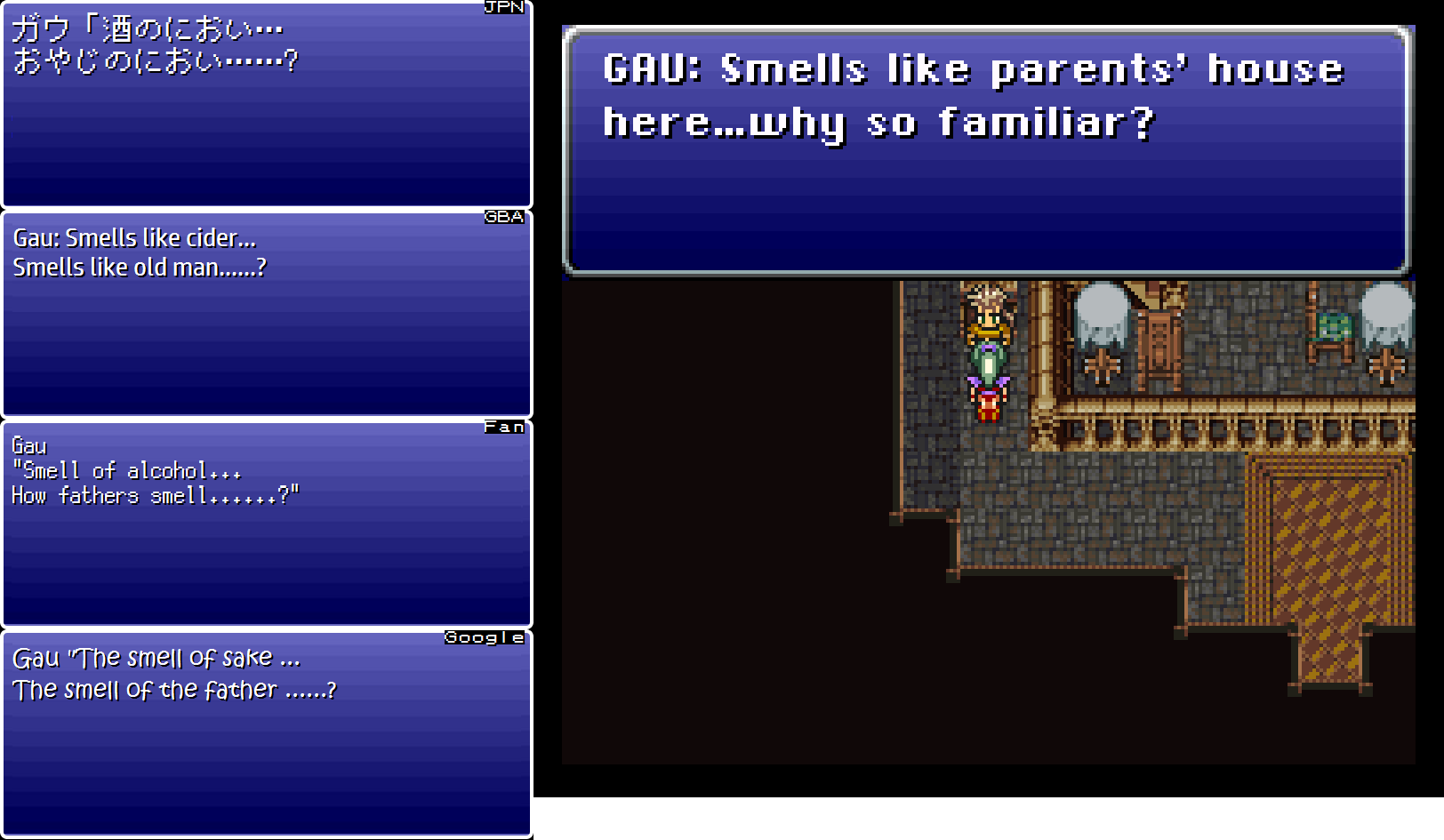
If you visit the pub in Vector at this point in the game, Gau has an interesting line. In Japanese, it’s roughly something like:
The smell of alcohol… The smell of Dad/old man…?
The Super NES translation removes the alcohol reference. The GBA translation specifically mentions “cider”, while the fan translation goes with “alcohol”. I actually really like the fan translation’s phrasing for the second sentence: “How fathers smell…?”. It made me realize that Gau has probably only ever known one father, so who knows, maybe he thinks this is how all fathers smell. The Japanese writers probably didn’t have this interpretation in mind when they wrote the line, but the phrasing does allow for it to be read that way too.
Killing Time
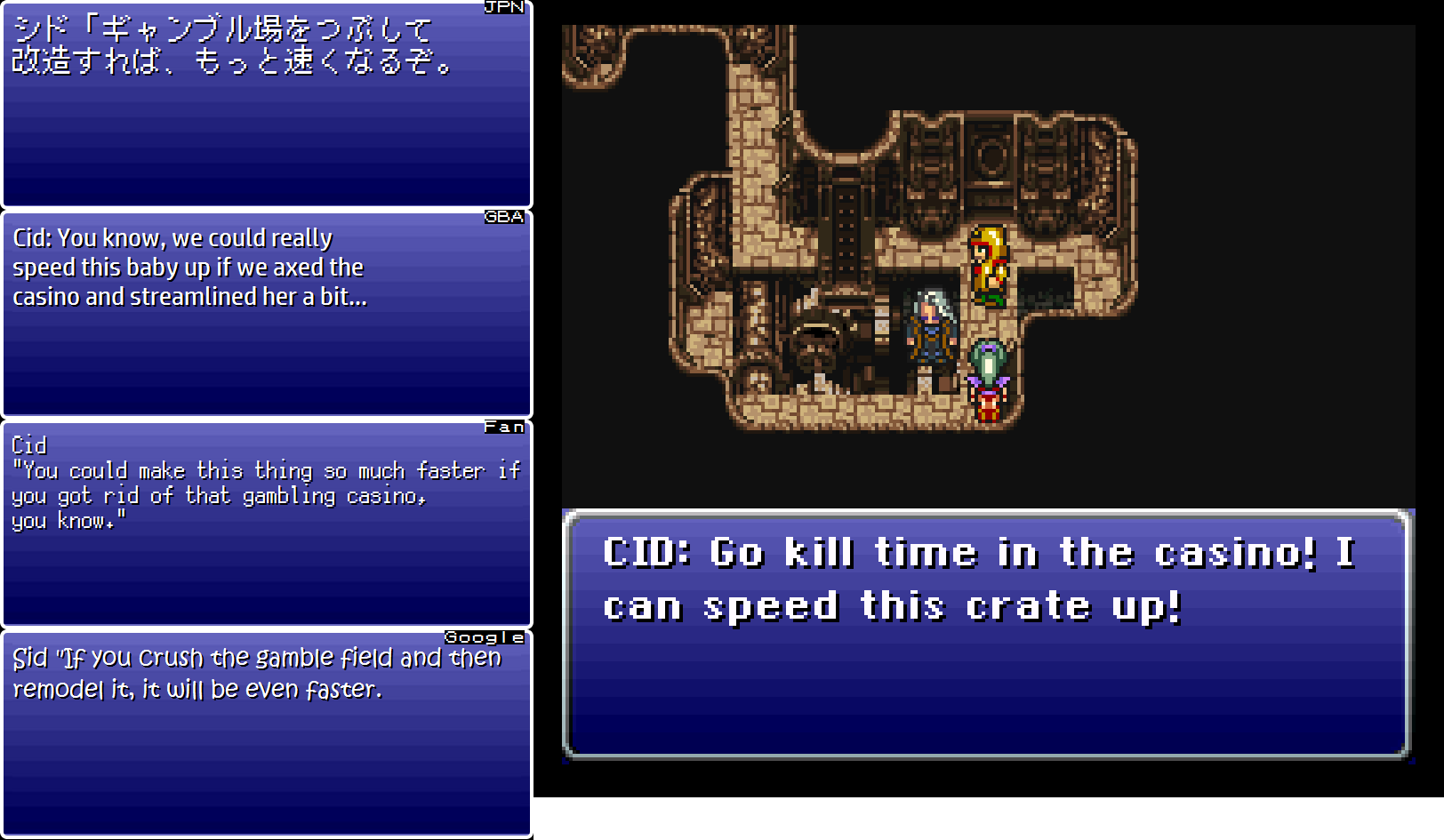
There’s an easily missed optional scene that you can see if you visit the crashed airship before leaving for Crescent Island. The scene involves Cid and Setzer trying to repair the airship. At one point, Cid tells Setzer in Japanese:
We could make it go even faster if we tore out the gambling area and did some remodeling.
The Super NES translator misread this line, which resulted in a very different translation:
Go kill time in the casino! I can speed this crate up!
The problem revolves around the word つぶす (tsubusu), which usually means “to crush” or “to wreck”, but it also appears in phrases like 時間をつぶす (jikan o tsubusu) or 暇をつぶす (hima o tsubusu), which mean “to kill time”. So it looks like the translator was reading too quickly and thought this line was talking about killing time in the casino rather than destroying the casino.
Every other translation gets this line correct – even the Google version.
Extra Fast
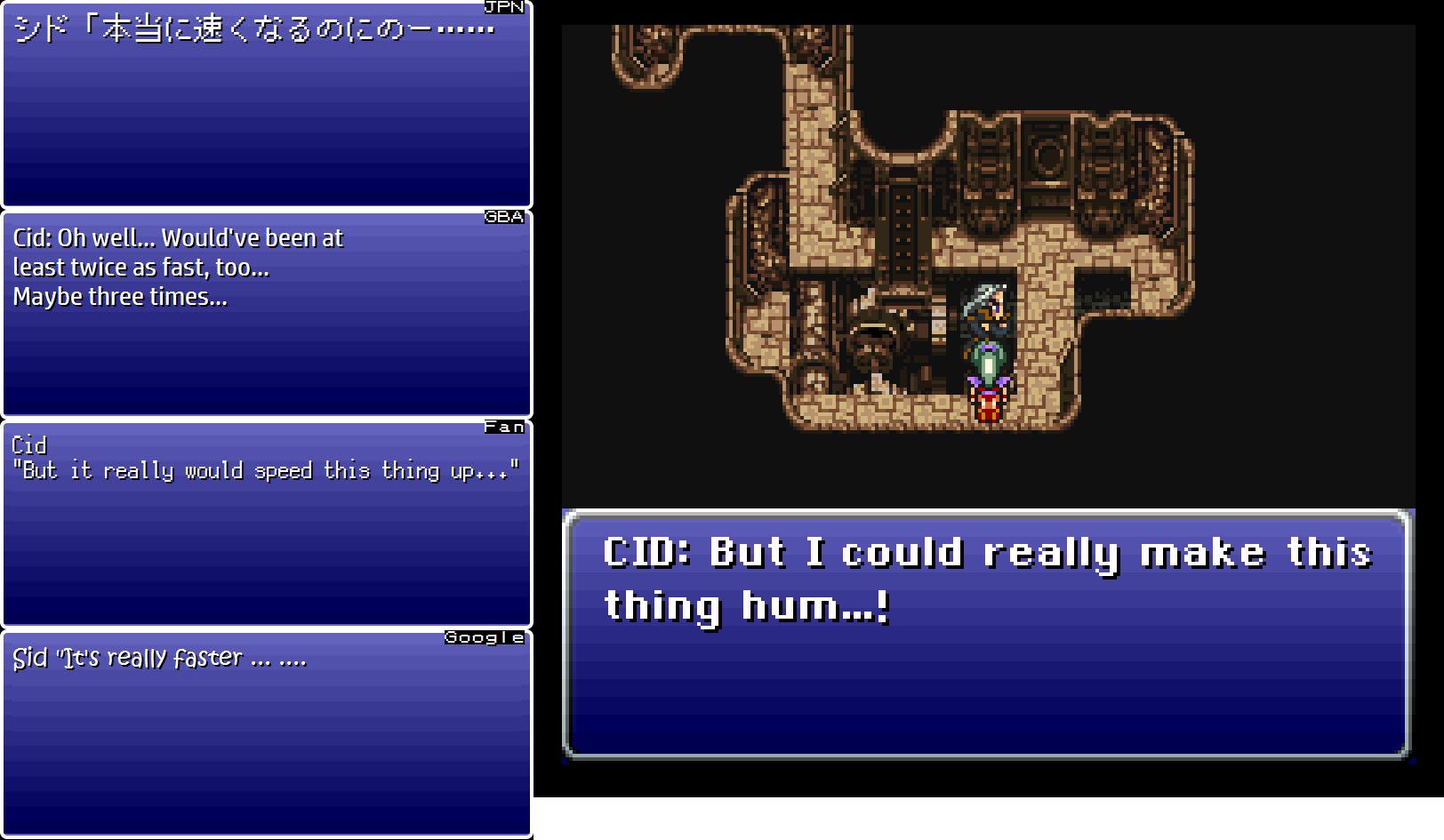
In the same airship scene, Cid says something like “But it really would make it faster…” in Japanese.
The Super NES and fan translations handle this line properly. The GBA translation changes it a tiny bit:
Oh well… Would’ve been at least twice as fast, too… Maybe three times…
The original text doesn’t include any such details, and it’s been pretty rare for the GBA translation to add stuff like this out of nowhere. Whenever we’ve seen new stuff like this added in the GBA version, it’s usually been a reference to pop culture or something similar. I get the feeling that isn’t the case here, though. How odd.
Update: Commenters suggested that this is very likely a reference to the “three times faster/three times ____” meme that arose from the Gundam series. It’s been a meme in Japan for a long time and it’s been a meme outside Japan too. Just look up “3 times faster” on Google and you’ll find all kinds of joke videos, joke sub-Reddits, and joke images.
Daryl’s Name
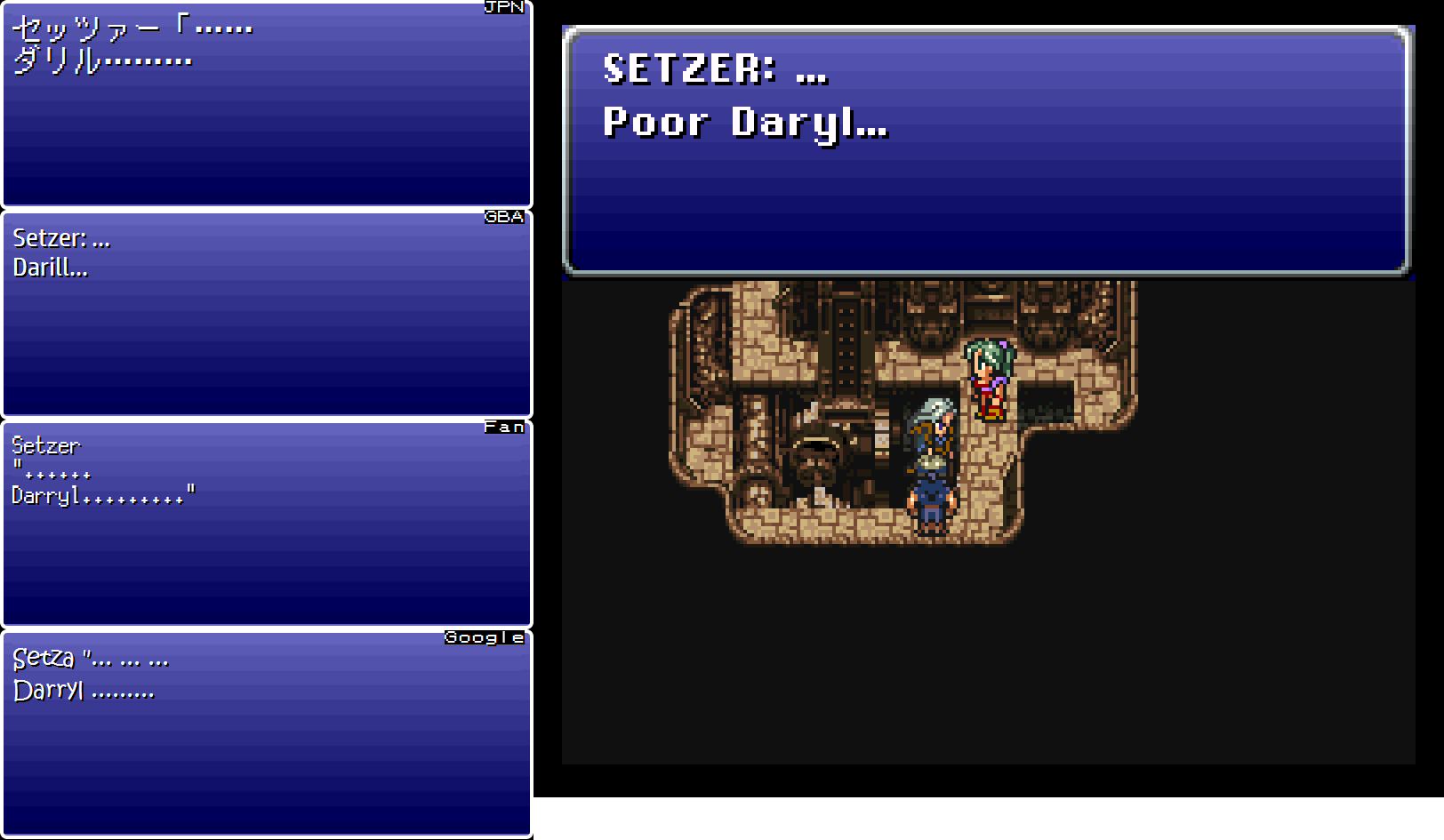
This airship scene is the first time we hear about Setzer’s background and his relationship with a woman. In Japanese, this woman’s name is ダリル (dariru), which could probably be spelled 20 different ways in English.
The Super NES translation spells her name “Daryl”, the GBA translation goes with “Darill”, and the fan and Google translations use “Darryl”.
I’m surprised to see the GBA translation use a different spelling than the Super NES translation – after all, we just saw how the GBA translation kept the mistranslated “Crescent Island” name as-is. On a hunch, I decided to look through the official Japanese guides, and yep, it seems they spell it “Darill” too:
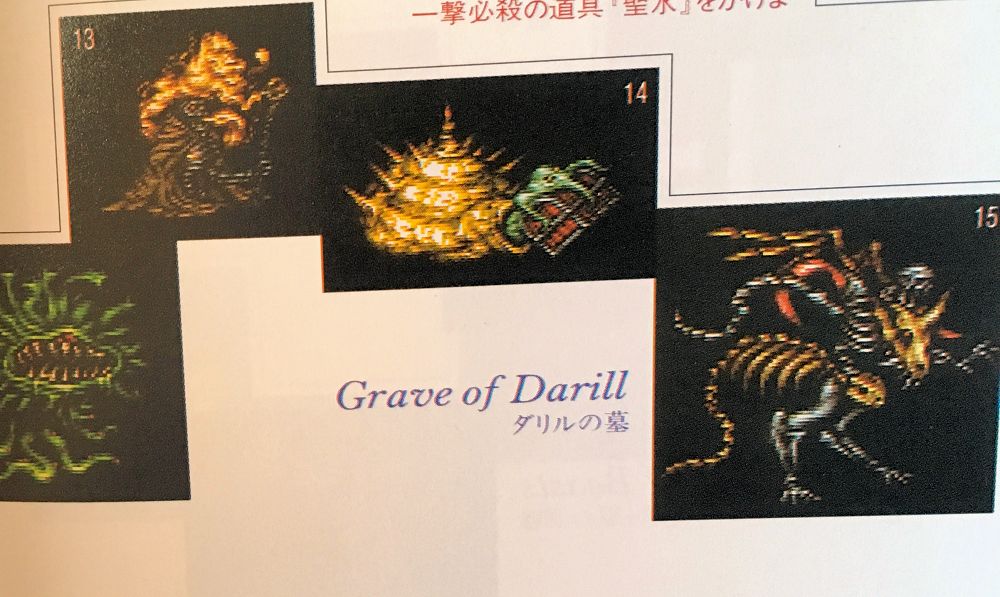
The “Daryl” spelling in the Super NES version wasn’t incredibly wrong or anything, and it’s a legit English name, so I’m not sure why it got changed when other names didn’t. It makes me wonder if she’s referenced in any other Final Fantasy games and how her name might be spelled in them.


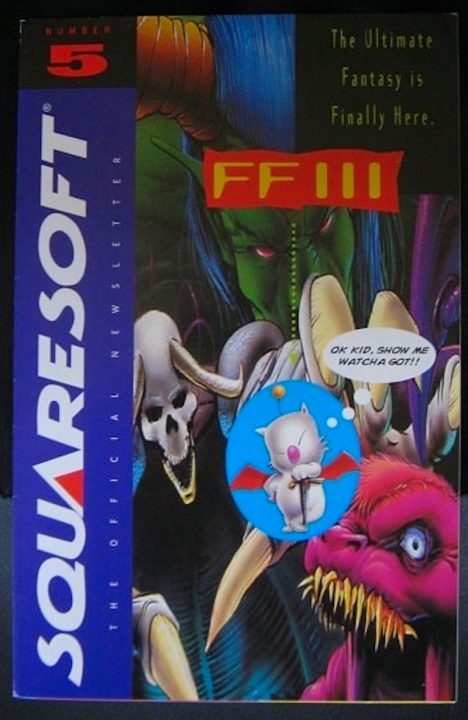
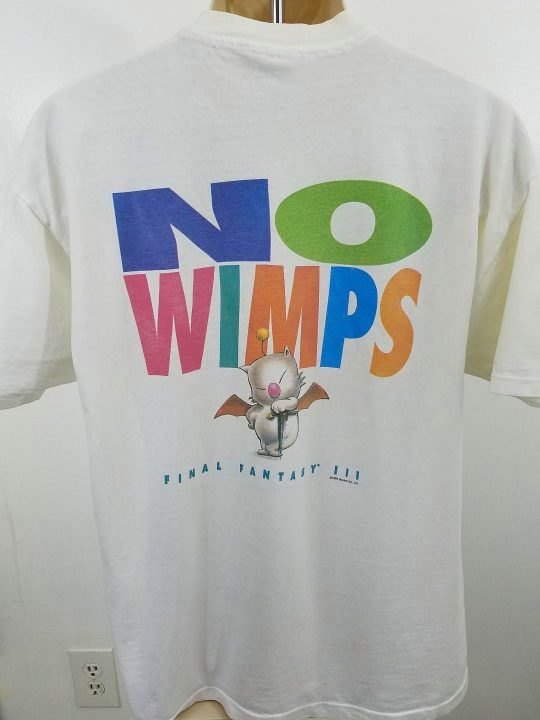
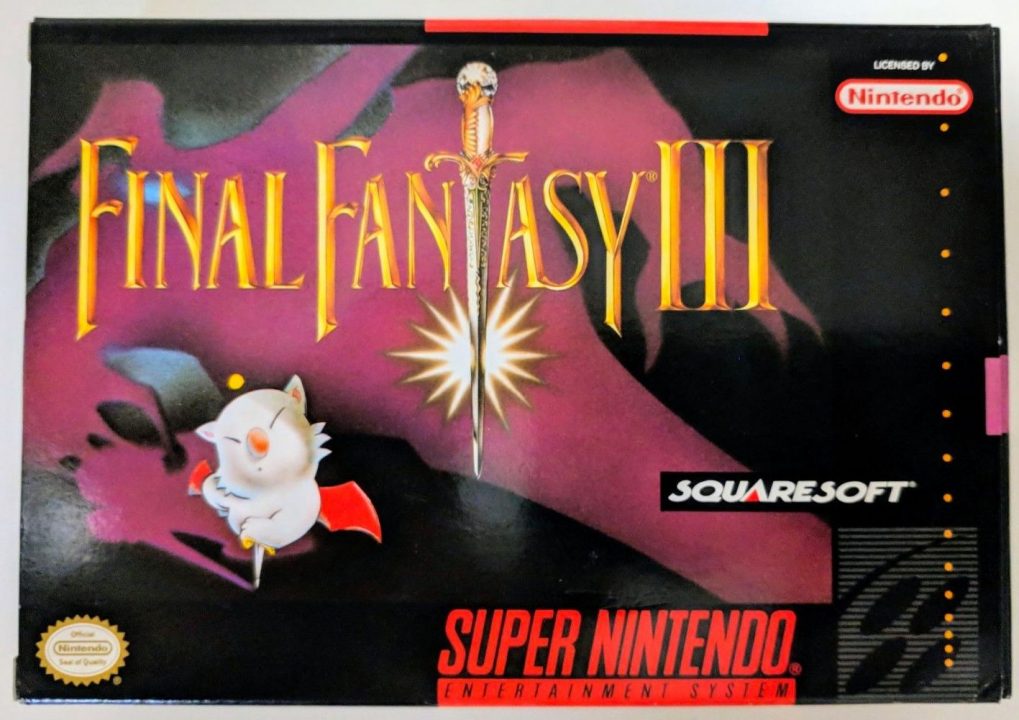
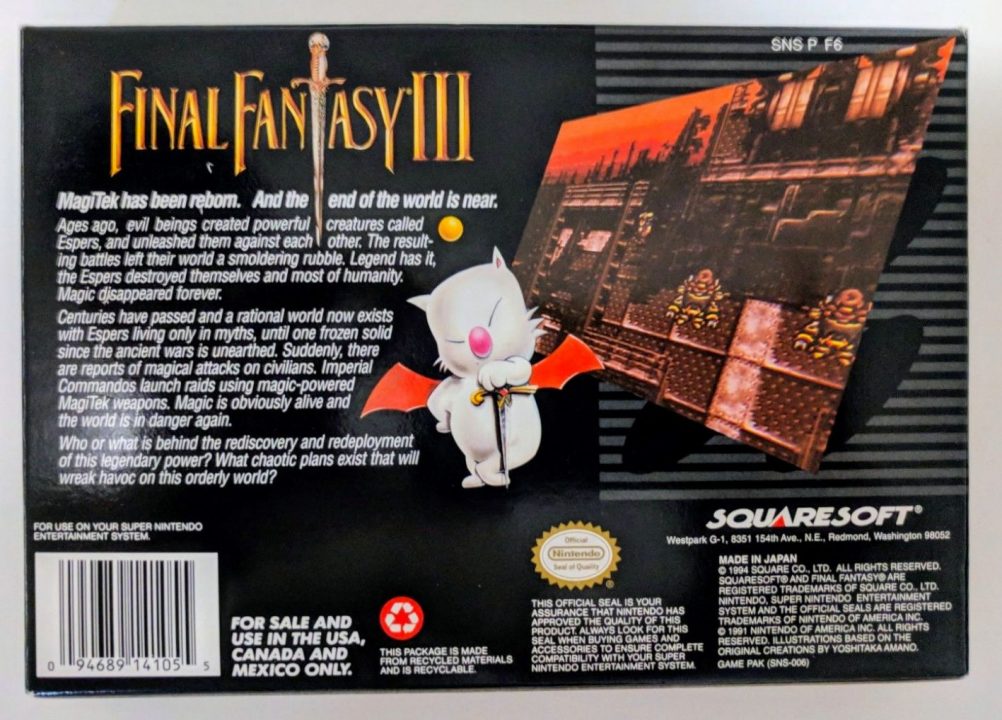
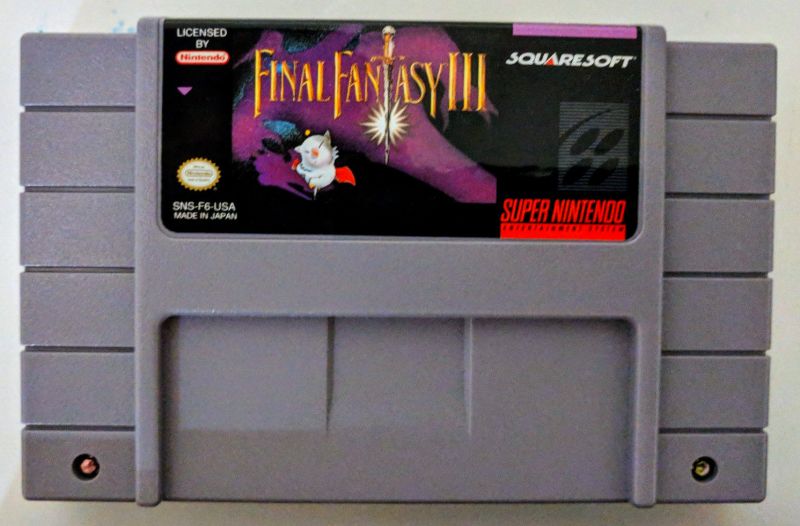
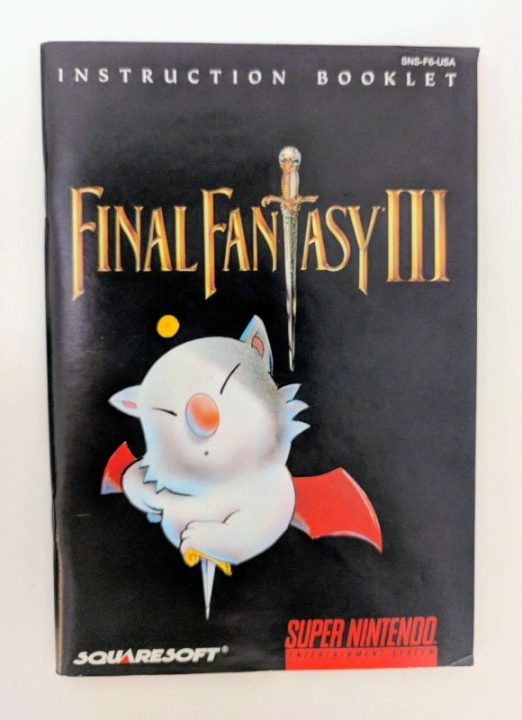

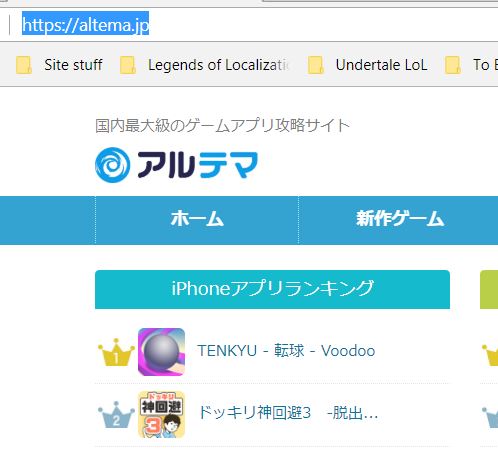
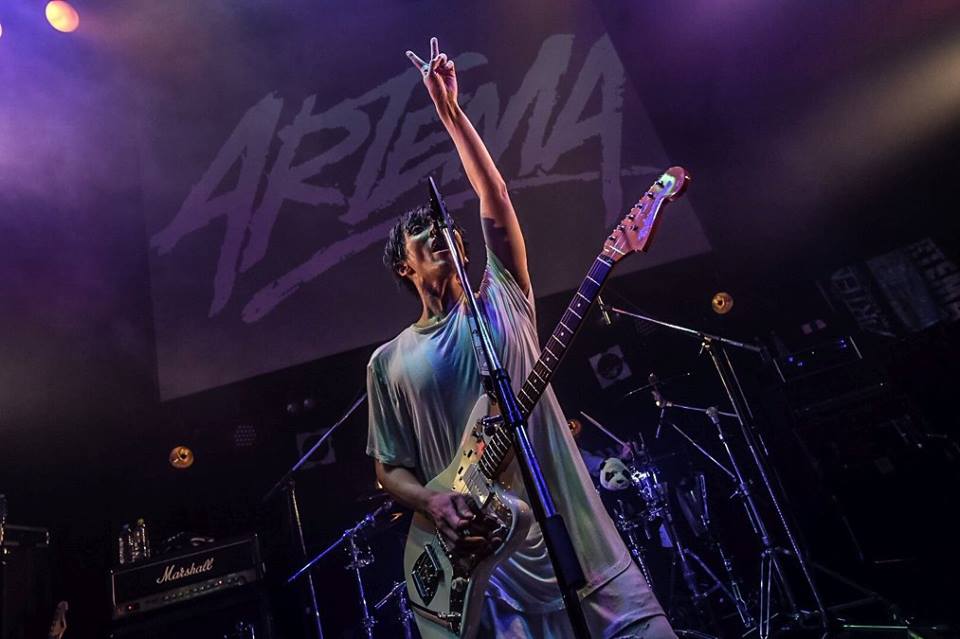
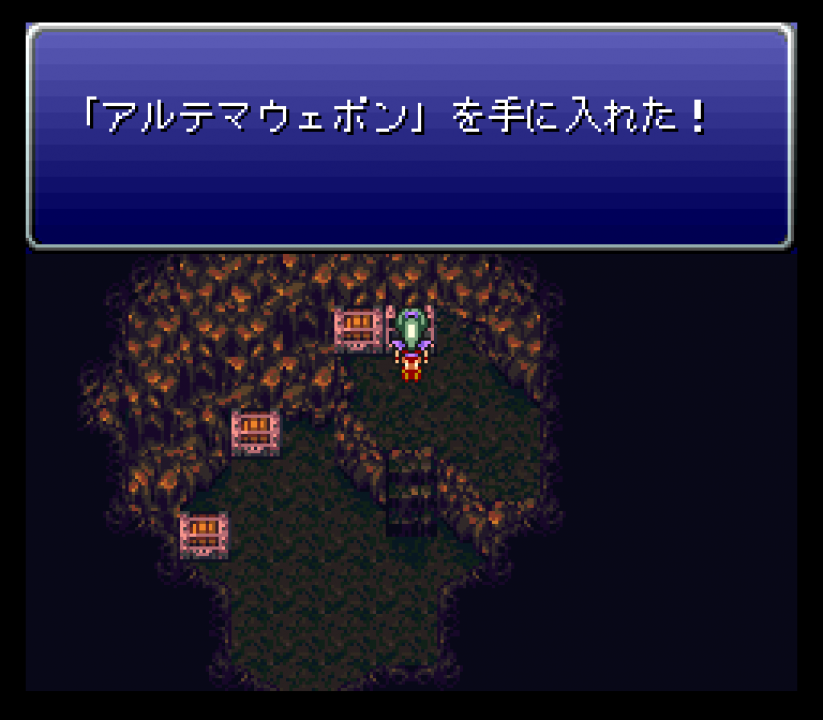

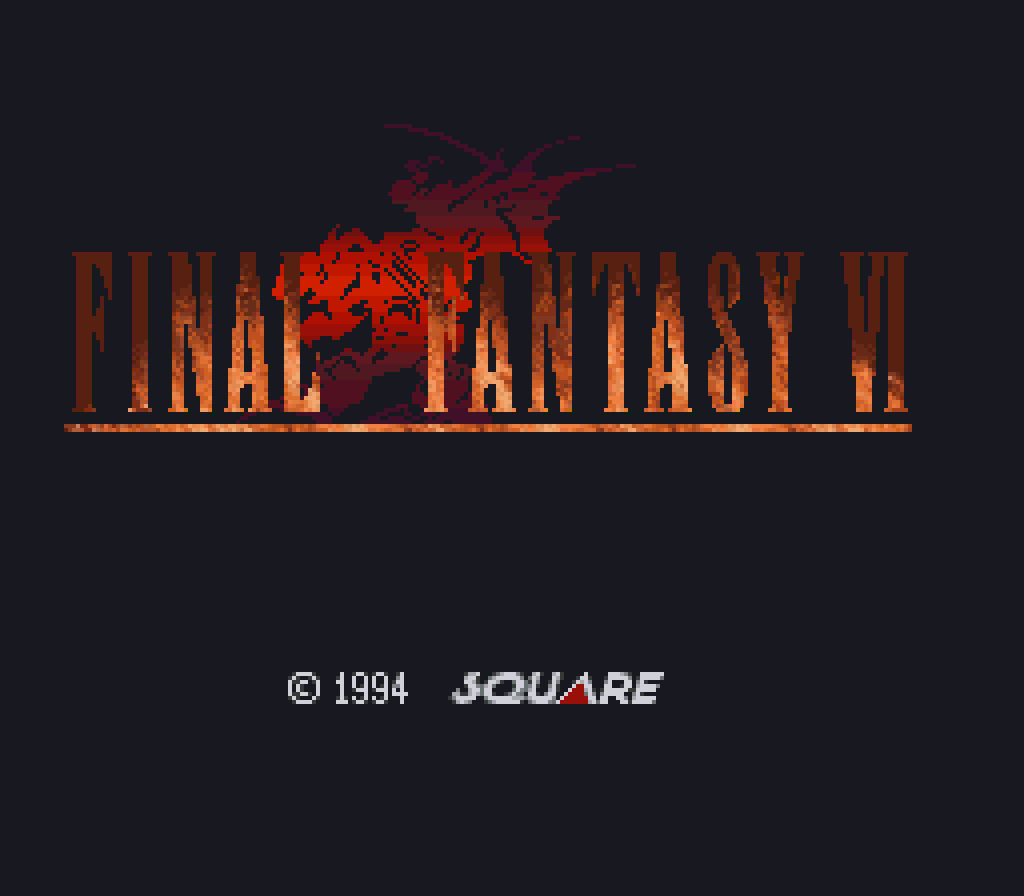
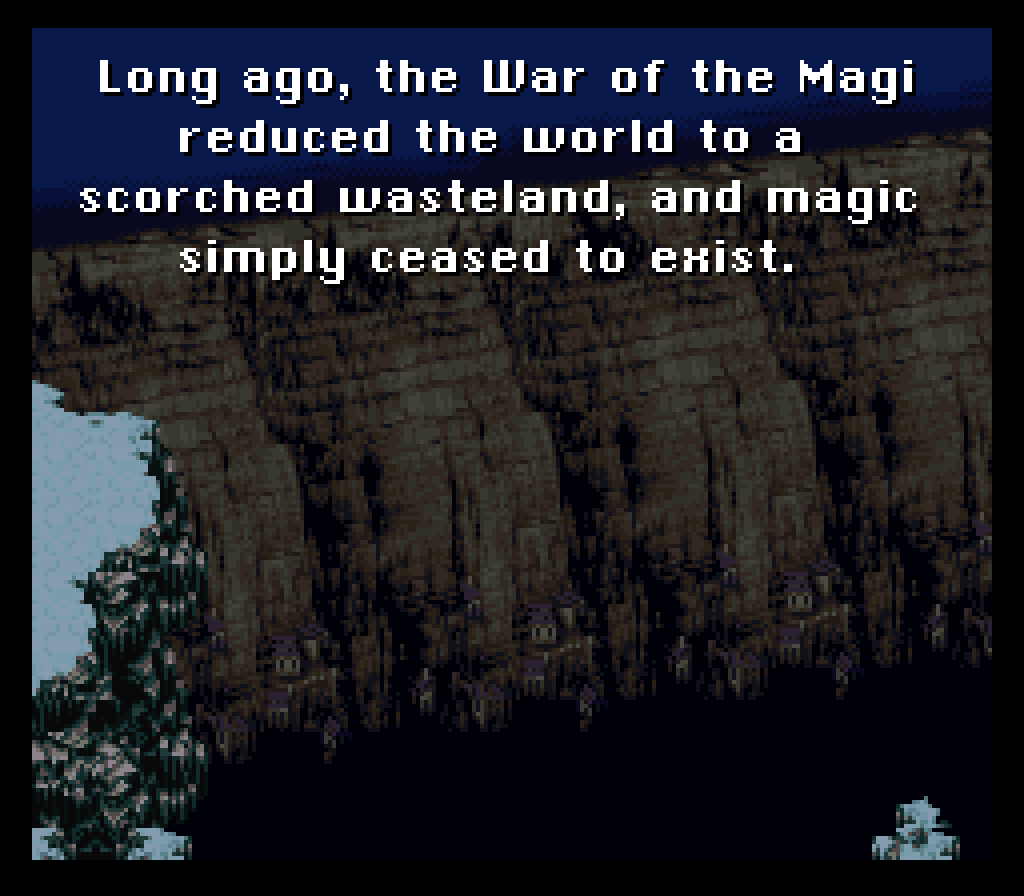
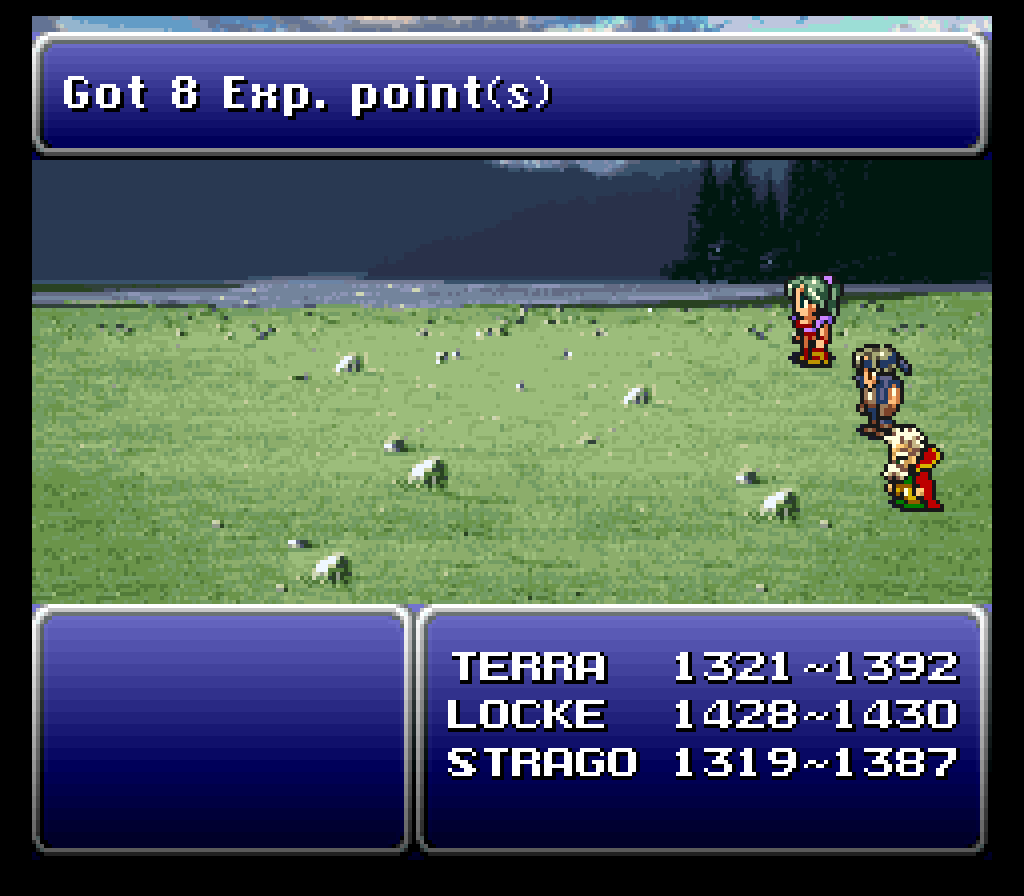
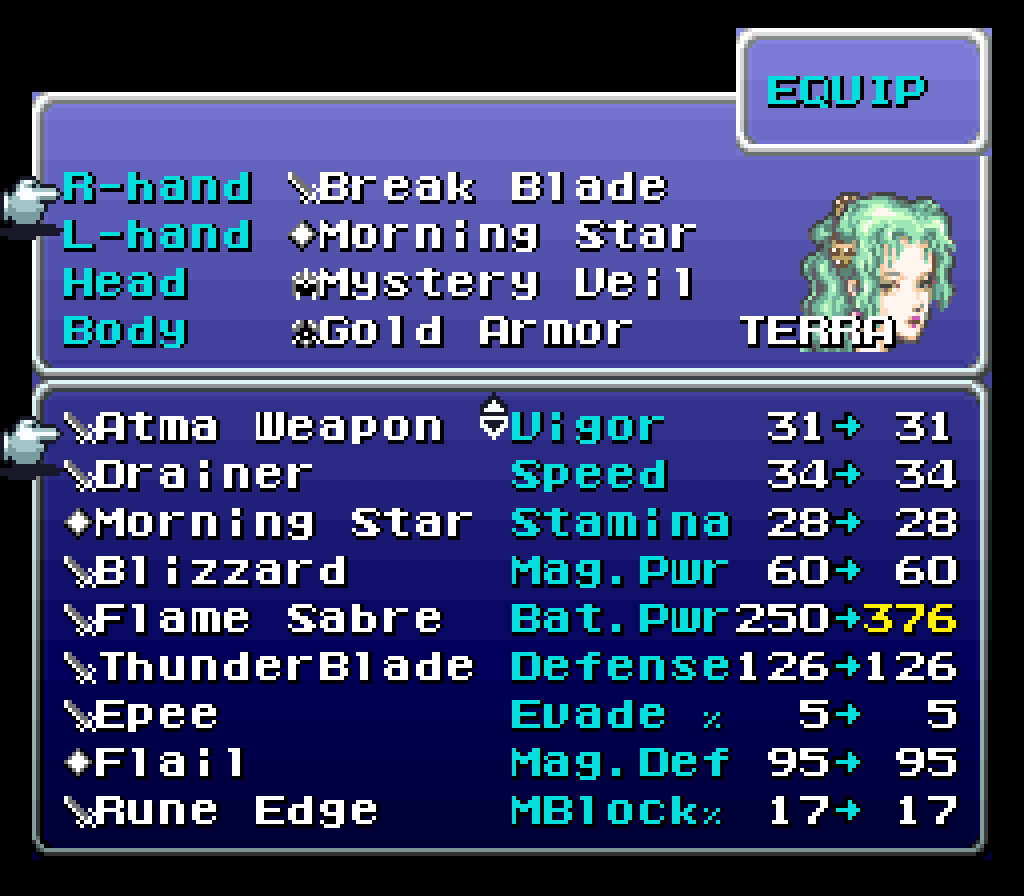
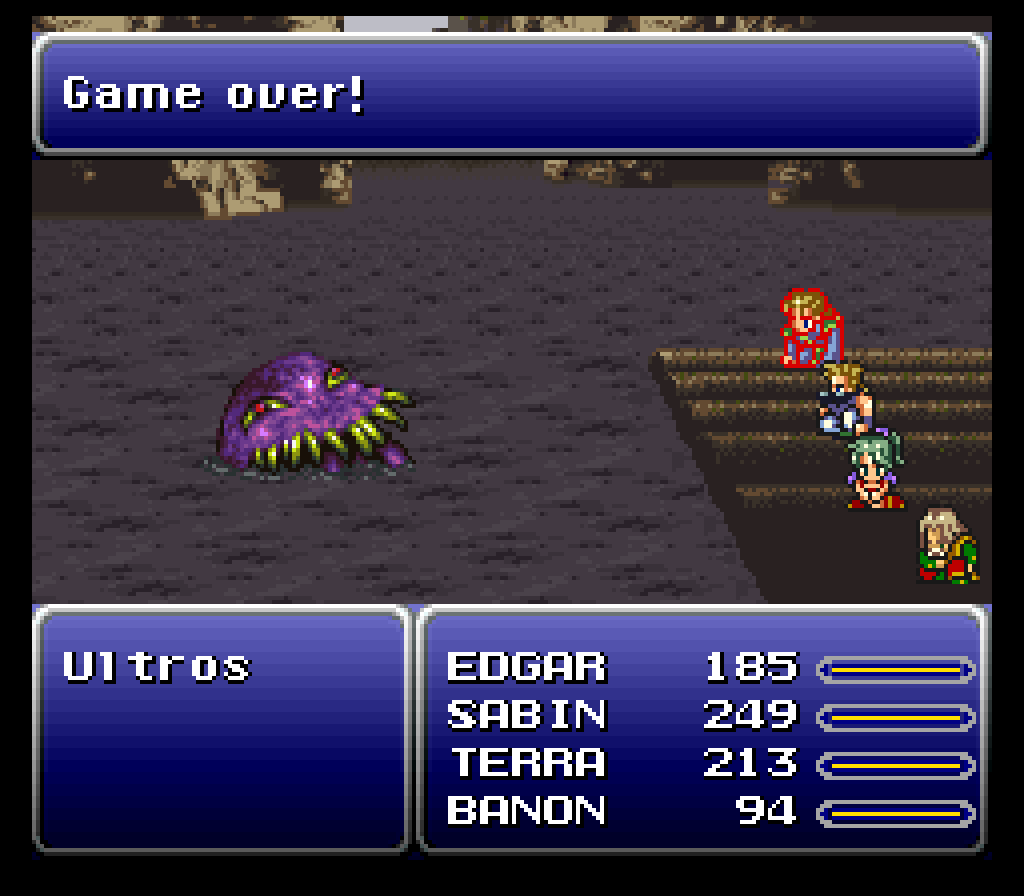
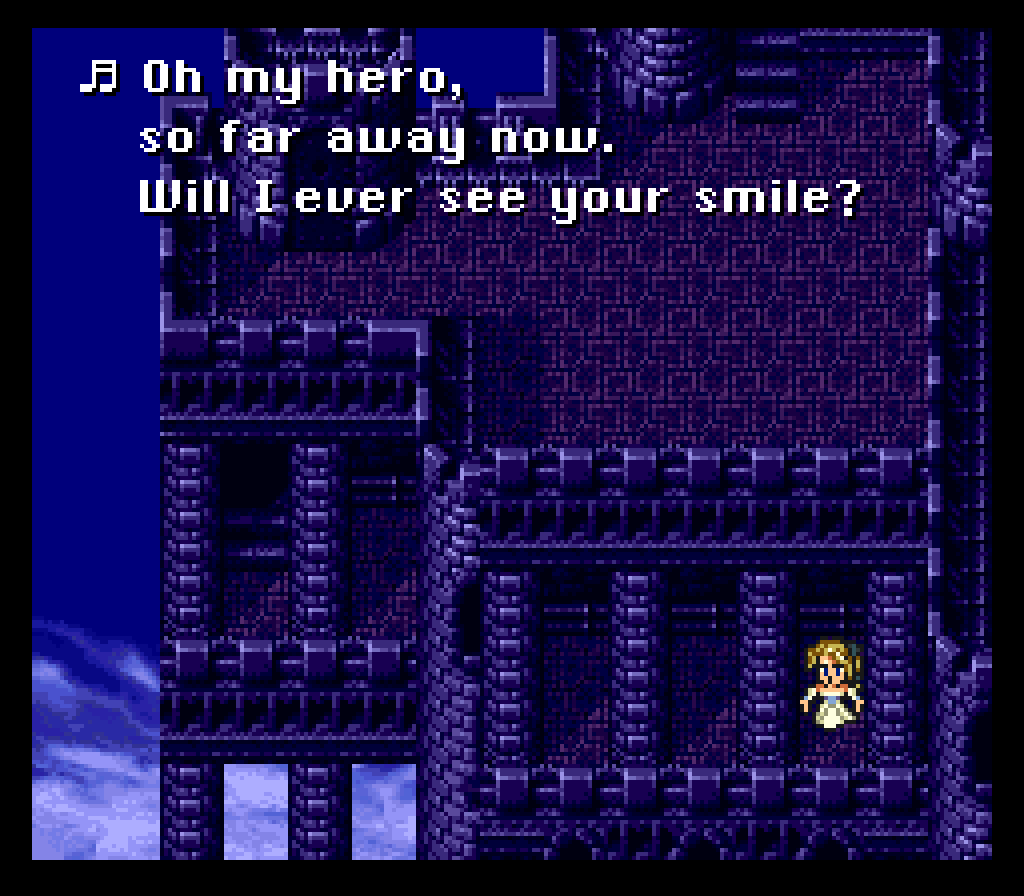
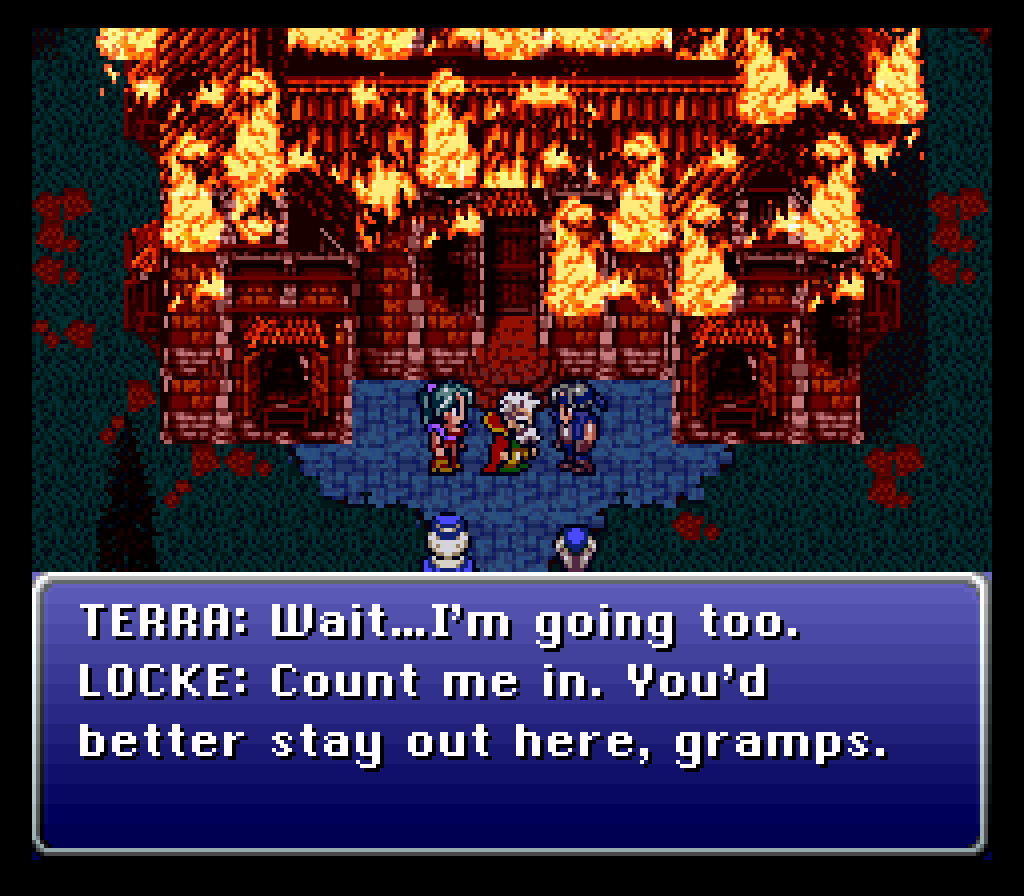
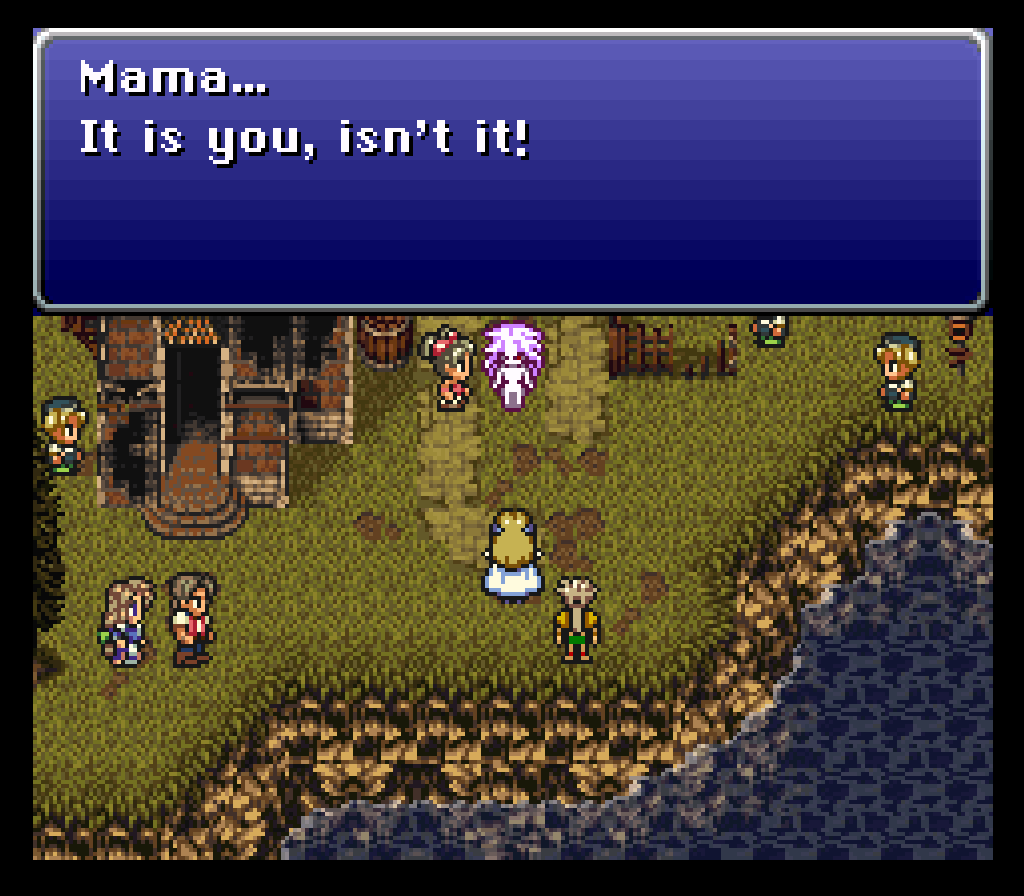
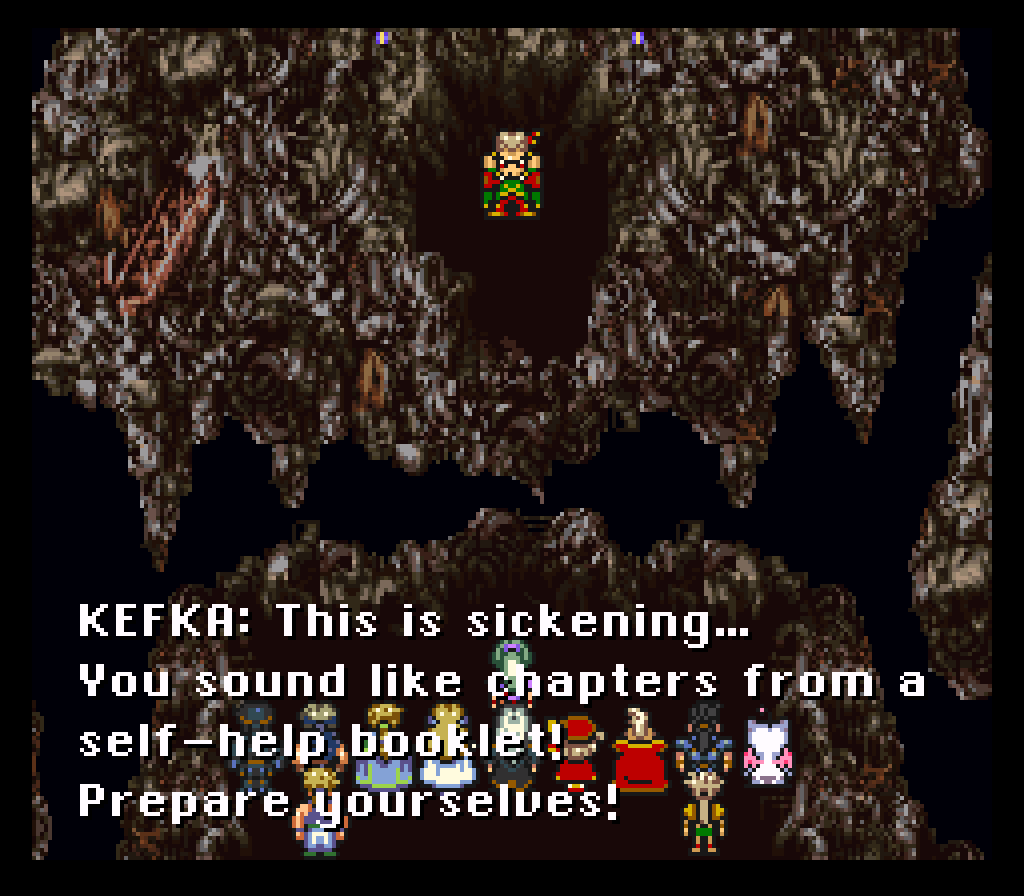
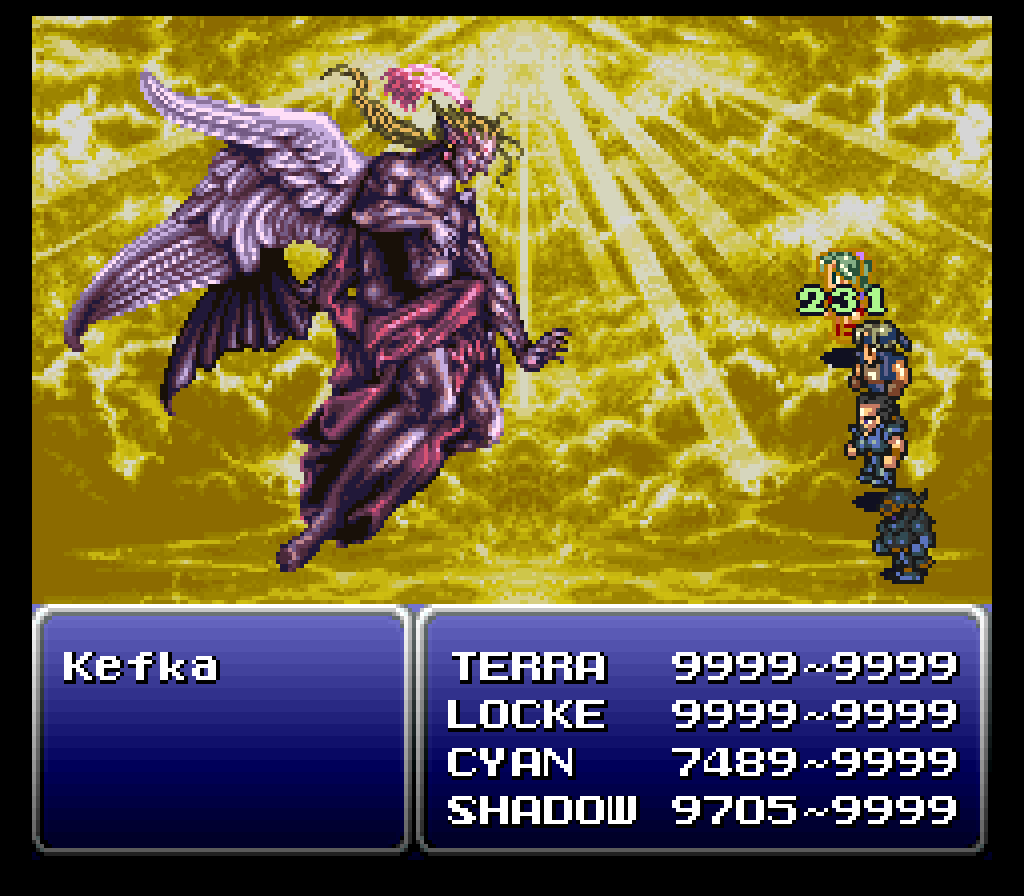
![press start to translate [Final Fantasy IV] press start to translate [Final Fantasy IV]](https://legendsoflocalization.com/wp-content/uploads/2019/08/bbenma.png)
You mention Mog’s presence in FF VI’s “North American” advertising, but as a Canadian, I don’t recall ever seeing ads for FF VI outside of game magazines! I was surprised when I got on the Internet and learned there was a commercial. 🙂 I might be alone on this one. Thanks for the series!
I’ve also never seen any advertising for this game outside of magazines. I think the only Square games I’ve ever seen television advertisements for have been Secret of Mana, Secret of Evermore, and FF7. (Secret of Evermore’s television ad was…kinda dark.)
Actually I don’t even remember if I saw the commercial either back in the day. If I did, it must’ve been like once or maybe twice at most, because I didn’t even remember it until I saw it on YouTube a couple years back. But I do remember the Ogopogo Examiner thing, the print ads, etc. clearly enough.
It’s interesting to me because before this, Square was like “oh no these games are too hard and complicated for gamers outside Japan” and then with this game they’re just full-on embracing that fear and using it to sell the game.
The thing with the airship going three times faster might be a Char from Gundam reference. Kinda odd to include case this is the reason.
That would be amazing given only the most hardcore Japanophile would even know what Gundam was in 1993-4. I think Gundam Wing was the first localized property, and that wasn’t until 2000.
The English GBA version of FFVI came out in 2007.
If that’s really it, man, Tom Slattery is a huge, uber-nerd. One of us! One of us!
He knows the most obscure trivia from both western fare like D&D, LotR (as evidenced by words like “dweomer” and “Feymarch”) as well as Japanese media as you mention. I guess this means he was ideally suited for this job. I wish he was still doing video game translation.
Whoa, dang, I think that’s probably exactly it. Nice catch!
Similar to how the enemy encounter list works in the original Final Fantasy, Veldt encounters can be manipulated via save/reset/load. Each cycle advances 13 “packs”, up to a total of 64, at which point it wraps around. Each pack contains up to 8 candidate battles, depending on rages cleared and/or presence of dummied battles. An entire pack can be dummied out. Packs can be looked up in the algorithm FAQ. TL;DR you keep saving and resetting to get to the same candidate pack over and over again until you get the battle you want. The downside is you’ll still need to fight up to 12 battles depending on the construction of your cleared rage list.
As for Mog’s “attitude”, I think Square US was attempting to replicate the success Sega had with Sonic. Just about everyone else was doing it at the time, including Sega with its other properties.
I’ve been wondering throughout these overviews: are we certain Woolsey is the only translator/localizer? I’m not familiar with the profession, so I dunno, but would one person really do the Atma/Ultima thing? A lot of the rest so far seems to vary in quality/consistency that seems beyond the realm of one person making mistakes or editorializing. The writing style (e.g. presence of “Woolsyisms”) seems inconsistent. Is it possible some of the work was farmed out to uncredited subcontractors? Maybe to people really cheap, like students or interns? Woolsey is consistently credited for his speediness. Did he work “too fast”?
>Did he work “too fast”?
Absolutely. He had really nasty deadlines and has admitted to having to rush things out, which is definitely to blame for a lot of the sloppier mistakes in the translation. He’s also admitted to just largely making stuff up when it came to monster/item names, since he didn’t have the kind of time it would take to work out what their names are supposed to actually be.
Yeah, people in the chat were trying to guide me through the packs to get what I wanted, but my luck was poor and I wound up wasting more time than I had hoped 🙁 But I’m glad to have learned more about how the game works now.
I don’t have a link handy but Woolsey has gone on the record that he had to move his Family to Tokyo for a month and had to finish the entire translation within that time. Based on other info he’s shared and other old info from Square itself, it seems very unlikely interns or subcontractors or anything like that were used. That stuff is super common now, but the industry was still all about “DIY translation” at the time.
The problem you were having with trying to get the Stray rage is you never actually fought one. At the point in the game when you normally see them (during Sabin’s part of the story split), you were running away from all of the fights to make sure Shadow wouldn’t leave the party. Getting enemies to show up on the Veldt requires you to defeat them, not just see them.
Rages are cleared by running. See low level game guides or videos for reference as this mechanic is essential to get through the game.
I seem to remember reading that the name Atmaweapon was chosen to fit in the 10-character limit for enemy names in battle, but I can’t find anything confirming this so maybe I’m just delirious in my old age
I love the comparison of Mog to Poochy. Lately, I’ve been noticing a trend of people online using that comparison for various characters in various franchises. For example, I’ve heard the guys on the One Piece Podcast refer to several characters in that series, like Ace, as Poochies.
>Moglie
It’s a portmanteau of mogura and koumori, so I’m not sure where you and Sky Render are taking that spelling from. Most non-English translations go with “Moguri”, I believe.
I’m not taking it from anywhere, I just pulled it out of thin air since I wasn’t sure what the intended spelling was supposed to be at the time.
The whole “moogle” name is kind of interesting. English speakers pronounce it as a long oo (rounded lips), but I’m pretty sure the doubled-up o’s are intended instead to indicate the long o in Japanese (two morae). I’ve always been a bit confused about why all moogly things get shortened to “mog” instead of “moog” in English. Mog house in FFVII or Mog Ship in the Universal Studios Japan ride or even the recurring character’s name Mog.
The “moogle” translation was adopted very early on, in the first Seiken Desentsu game (localised as Final Fantasy legend), and I guess it became iconic. I think it was originally translated by a Japanese speaker who didn’t intend the doubled-up o to become a rounded-lips English o.
>I’ve always been a bit confused about why all moogly things get shortened to “mog” instead of “moog” in English.
It’s like that in Japanese too. The species is モーグリ, but all the Moguri stuff gets shortened to “モグ(something)”. Japanese shortform always uses the first two characters of each word, but if the second character is a prolonged sound mark, it’s somewhat common to ignore it and use the first and third character instead. It’s not always done (“Super” is particular is always shortened to スー), it’s mostly a case of what sounds better. “Mog House” looks a lot better than “Moo House”.
The first Seiken Densetsu was localized as Final Fantasy Adventure. Final Fantasy Legend was the first SaGa game.
Ah, I see.
Not sure where that explanation came from, honestly. I assume a guidebook or interview of some kind. (anyone?)
I’m glad you got the Setzer and Cid scene!
I always took “he’s on his last legs” to mean that Kefka’s position and standing in the Empire were at an end.
Grand Triangle Island doesn’t look like a triangle either. Not with that branch sticking out.
“Darill” wasn’t pulled out of nowhere in the GBA version. The SNES version was actually inconsistent with her name, as in cutscenes, she was referred to as “Daryl”, but her tomb was called “Darill’s Tomb”.
Also, if I remember correctly, the PSX version tweaked the SNES version’s text somewhat, and “Crescent Island” was called “Great Triangle Island” there. (Though admittedly, I didn’t play through the whole PSX version… I seem to recall seeing the name in the bestiary, so I can’t say 100% for certain if that name was indeed used in-game.)
“Daril” is what Nomura named in her design artwork.
When Tetsuya Nomura designed Darill, it was spelled DARIL: https://vignette.wikia.nocookie.net/finalfantasy/images/6/6c/Darill_FFVI_Nomura_Art.jpg/revision/latest?cb=20130107164700
I suspect at one point she was up for consideration as a playable character. Possibly the whip-wielding job that is missing from the lineup. I have heard rumors that the Beastmaster class, which was in FF5 but not here, was a possible contender for someone associated with Strago, possibly his wife or something similar.
Speaking of Strago, since he has triangles associated with him with Trine and Triangle Island with Hidon, it seems they were going for a geometric theme here.
Also, Clyde, did you know Gau has a scene here where he runs from the boat and Locke says the kid has a fear of boats? It’s virtually impossible to get, though, since you have to get Gau into the party when it’s just Terra and Locke, so you may have to hack it.
Whoa, you’re right! Here’s what my script dumps have for each version of the secret Gau-related line:
Japanese
SNES translation
GBA translation
Fan translation
Google translation
“I can’t be helped.”
Ugh! Of course the fan translation would go with that.
You want to give an actual explanation as to why that’s supposedly a negative?
It’s not a very common phrase in English ( or at least much less common than in Japanese), so it reminds the reader that they’re reading a translation.
Reading a phrase that’s common enough in English to have its own entry in most dictionaries “reminds the reader that they’re reading a translation”? Come on now.
https://dictionary.cambridge.org/dictionary/english/it-can-t-be-helped
https://www.ldoceonline.com/dictionary/it-can-t-be-helped
https://www.macmillandictionary.com/dictionary/british/cannot-can-t-help-something
https://idioms.thefreedictionary.com/it+can%27t+be+helped
https://www.merriam-webster.com/dictionary/cannot%20be%20helped
Do the example sentences provided in those dictionaries remind you that you’re apparently reading a translation, too?
The phrase “It can’t be helped” is completely overused in translations from Japanese, especially those made by amateurs, to the point that TV Tropes calls it “a Japanese stock phrase”:
https://tvtropes.org/pmwiki/pmwiki.php/Main/ItCantBeHelped
So your argument is basically “TV Tropes says it’s bad”?
Is “My name is…” a bad phrase too? That’s pretty overused in translations too, is Tv Tropes okay with that?
I’m going to agree here. The idea that “It can’t be helped” is unnatural in English is something that I don’t think holds water. I hear it (and use it) all the time, although admittedly it’s usually in more grim and dire contexts than “ah well, what are you gonna do” situations.
There are two issues. The first is that in Japanese, you can repeat yourself and it’s still considered good style, but in English it’s a crime to use the same word twice in a sentence. Or the same phrase twice in a paragraph. It looks like you’re trying to use a literary device called an anaphora.
The other problem is “it can’t be helped” is too long, it just throws off the rhythm and it doesn’t sound cool.
…so the phrase being rare in English actually does matter, because just using it twice in a story will look weird.
I actually had a problem editing someone’s translation once, because they read too many manga scanlations and actually talked like that and said things couldn’t be helped. They also made uguuu anime noises in real life – don’t want to turn out that way, do you?
…but it’s *not* rare in English. It’s used frequently in translations *because* it’s a common English phrase that means approximately the same thing as the common Japanese phrase.
(Actually replying to a s , but apparently there are too many replies in this thread to continue to nest them.)
Regardless of whether it’s common or not, I don’t think this is the right situation to use it in, as HMFlowers points out below. While it’s similar in meaning to “it can’t be helped” I think the nuance is different, as the below Star Trek examples point out.
I’m from Utica and I’ve never heard the phrase “it can’t be helped”.
You know what my favorite weeby anime is? Star Trek.
SCOTT: But Mister Spock hasn’t sent the proper co-ordinates yet.
KIRK: It can’t be helped, Scotty.
– The Enterprise Incident, TOS, September 1968
SPOCK: Captain, that will delay our work at Beta Aurigae. It means reversing course.
KIRK: Yes, it can’t be helped. We must take Doctor Lester to a place where she can be treated.
– Turnabout Intruder, TOS, June 1969
PICARD: How long will we be on impulse power?
LAFORGE: A couple of hours. Can’t be helped.
– The Child, TNG, November 1988
WORF: Sir, that would put us substantially close to the Romulan side of the Neutral Zone.
PICARD: That can’t be helped. Ensign, lay in a course. Warp factor eight.
– Contagion, TNG, March 1989
Ugh, these lines are so awkward and badly translated I can’t believe it. They really should have gone with something that sounded more natural in English.
Ugh, dubbed Star Trek is the worst. Why can’t they just give us the originals?
Oh not in Utica, no. It’s more of an Albany expression.
It’s a, uh, regional dialect. For steamed hams. 🙂
Also, Darril may be Nomura making a reference to the Darryl in Final Fantasy 1. It would mean he would have had to have played the English FF1, but it’s a possibility:
http://finalfantasy.wikia.com/wiki/Darryl
The “Maybe three times” line reminded me of the song Two Times (https://www.youtube.com/watch?v=PbkInTnNQ28) but I doubt that it’s the reference as the lyrics don’t really match.
The banquet mix-up in the fan translation is somewhat important, as it can cause you to miss out on the final reward. In the banquet, there are five tiers of rewards you can get. The highest tier requires that you obtain 90-93 points. The questions about Kefka are worth 5 points (Leave him jail), 3 points (Pardon him), and 1 point (Execute him). This means that if you pick “Pardon him” and get everything else correct, you can obtain a maximum of 91 points and still get all of the rewards. However, if you’re playing the fan translation and pick the bottom option (which is actually supposed to be “Execute him”), then you can only get a maximum of 89 points and will miss out on the last reward. Granted, the final reward (a Charm Bangle/Ward Bangle) isn’t great and most people who play the fanlation will probably know what to do, but it can still trip up people who started with the fan translation, as I did.
Daryl is one of the names that can automatically be selected for a character in all versions of the original Final Fantasy from the GBA version onwards. In those versions, her name is referred to as “Daryl”, which only adds to the inconsistency surrounding her name.
Finally, I’m not sure if you’ve seen this, but there’s an interview from 2007 with Ted Woolsey that touches on his experience with FF6. The highlights are that he only had 30 days to translate the game, which was further compounded by the fact that his first two drafts were rejected for being too large; most of his jobs with Square were rush jobs; and that he had only played through FF6 once, missing some of the sidequests. This explains why we’ve been seeing so many lost nuances in the SNES script as the game goes on.
http://www.playeronepodcast.com/forum/index.php?/topic/145-transcript-of-ted-woolsey-interview/
Cider is often used to refer to the non-alcoholic drink in the US. (might be a regional thing?) It’s only recently that alcoholic cider’s been making a comeback after Prohibition, so it’s usually called “hard cider” to distinguish it from the non-alcoholic version. Back in the 90s, I think the association would still be mainly be soft cider, but it’s possible the term was picked for the double meaning.
When I was a kid I definitely assumed they were all drinking basically apple juice.
I feel like the Atma Weapon’s name might be an issue with space limitations rather than mistranslation.
When the villager brings it up, they mention that there are two things that share the name, the weapon and the monster. The monster’s name can only fit so many characters, and the space had to be taken out for “AtmaWeapon” to even fit. The item menu allows for an extra two characters so they could have fit “UltimaWeapon” in there, but then the names wouldn’t match.
I mean, I guess they could have gone with “Ultima Wpn” instead. I don’t think it looks as nice, but that’s just me.
Also, small error in the article. When Gau is in Vector’s pub/cafe, there is no mention of cider in the SNES translation.
Oops, thanks for the tip!
And yeah, I’d considered name length issues being the cause for “Atma”, but for whatever reason I’m not fully convinced by it. I think it’s because I can see me or any most other translators struggling with アルテマ under the same conditions Woolsey had been in.
I’d chalk it up to him just rushing through these names, misreading this particular one as アテマ, then just writing “Atma” and moving on to the next one. Woolsey has gone on record saying he spent very little time on item/monster names since he knew it’d take much more time than he had available to actually research what all these wacky jumbles of katakana were supposed to mean.
The fact that he DID get it right when he got to the spell list probably just means he translated the spells afterwards and didn’t remember encountering this name before in the weapon and monster lists.
We see the same in Chrono Trigger, where he’s extremely inconsistent in how he translates “mazoku” because it takes him a while to realize it refers to a particular species, and by the time he DOES realize and chooses “Mystics” as his translation, he’s long since forgotten he’s translated the same word many other ways already in earlier dialogue. The man worked under conditions and deadlines that didn’t allow for a whole lot of crossreferencing and re-editing of already-finished passages.
The name Darill being chosen as opposed to Daryl for the GBA translation is probably also because that character is supposed to be a woman, and Daryl is a primarily male name in English.
So how does the Nissan Altima fit into all this?
If you drive it really fast, it gets longer and starts to glow blue. Try it and see!
I’m seriously wondering if Woolsey mistakenly thought that “psychic” and “psycho” were synonyms.
In many Japanese games, the word “psycho” is used where in English we would use the word “psychic”. I don’t have a list of references handy, but I picked up on this while watching Chrontendo (there’s like 100 hours of that, so I’m not going to seek out the passage where Dr. S explains it). “Psycho Soldier Athena” is one example.
I had my suspicions, but… I really hate what the SNES translation did with Mog. Not just because I find “totally radical” characters to be entirely obnoxious most of the time (which I do!) but because this “attitude injection” *completely rewrites his personality.*
I don’t care if Woolsey or the marketing executives thought his character was “bland.” It’s still a character. And personally, I *like* polite, cute type characters. They got treated as “too boring to translate” so often though… I think he did this with Mallow in Super Mario RPG, too, who was more of a standard cute crybaby than the smart aleck the English translation made him into if what I’ve heard is true.
It’s one thing to look at a character trait that doesn’t work as translated *exactly*, and find a workable western equivalent that gets the point across. It’s even okay to “spice up” some more standard lines with something a little more memorable, as long as it fits the original tone it was going for. It’s something entirely different to take a personality and go “eh, you’re boring, I’m throwing this out and giving you a new one.” That’s not the job of a translator *or* a localizer.
From what I recall reading magazines at the time, Square was fairly open with their disappointment that their games didn’t have the expected uptake in the west. It’s the reason Mystic Quest was made. American fans felt betrayed by the lack of a Final Fantasy V port but the ROM would have been large and, thus, riskier than developing a replacement that fit into the smallest cartridge size in common use and sold at a discounted price. I think the success of Secret of Mana is what motivated Square to keep porting games at all. Really their investments in porting and localization didn’t truly pay off until Final Fantasy VII.
With this in mind, and the meteoric rise of Sega in the early 90s, due largely to the high marketability of “attitude” character Sonic, it’s understandable that Square might seek to recoup previous investments with a branding attempt. It only looks bad now because the campaign fell flat on its face, which is evidenced by claims in this thread and comments on the linked video that they were unaware of the advertisements.
Had Mog taken off as a name brand character and had his own successful spinoff series or at least successful merchandising, we’d probably have a different outlook on his divergent personality. As it is, “attitude” Mog joins the mascot graveyard of Aero the Acro-Bat, Bubsy, Gex, Zero the Kamikaze Squirrel, and many more.
Well… I doubt I would, personally. I even find the successful victims of this change annoying. Western 90s Sonic is someone I’d like to see get kicked in the gut.
I guess I can understand the decision from a purely profit driven standpoint, even if I feel like it has a good helping of characteristic managerial cluelessness. But from a “localization integrity” standpoint, it frustrates me.
More importantly, because of the pervasiveness of this attitude, I was deprived of cute, fluffy characters for the better part of a decade, and that is an unpardonable crime. Heck, they even tried to do it to Kirby, but he was so inherently cute that no one noticed until the Internet started pointing it out years down the line.
(At least by the time Klonoa came out this attitude had faded…)
I will never forgive Nintendo for keeping Panel de Pon away from us.
I am so tempted to email Nintendo an IPS changing the Tetris Attack title screen to Yoshi’s Puzzle League and a message like “licensing problem fixed. You’re welcome.”
Though I feel that with what Nintendo has done, maybe simply needing to change the title screen isn’t the reason they’ve refused to rerelease the SNES game outside Japan.
Sonic’s x-tremeness is not a localization thing, since the character was co-developed by American and Japanese teams. Based on what I’ve read, the Japanese team actually wanted Sonic to be a lot edgier.
What’s really amusing to me is that this same process happens in reverse when western games are localized in Japan. Google “japanese crash bandicoot” if you’re not already familiar.
I find the Japanese Crash Bandicoot redesign(s) as lazy and off-putting as the localized US box art from the 80s. In both cases I understand the train of thought but feel the results are underwhelming. I wonder if the Japanese complain about this sort of stuff like we do.
Before I knew it was a mistranslation, I always took Terra’s “something happened” as utter shock more than anything. She’s still unable to fathom what went down, so all she could muster is “something happened”.
It’s strange how I had made some of the mistranslated lines make sense in my head. While it didn’t make sense the first time, on later playthroughs I thought “Something happened” was referring to Terra’s connection with the Espers and was indicating that something was wrong, and that the Espers weren’t supposed to be acting like this.
The “bigger, scarier monster” behind Mog in the US cover is meant to be Maduin. I know this because I actually wrote a letter asking about it back in the day, which response I surely don’t still have, I’m afraid. So I can’t document a thing. :-/
That’s still a cool thing to have done, though. I always wondered what that was supposed to be.
Somehow, I completely missed that Darill was a woman when I played this. I even thought that the game was being very brave by implying a gay relationship in the mid-90s, so learning that was very much not the case is somewhat disappointing
I feel like I have to add one thing to the whole Atma Weapon discussion that I honestly thought would have already been mentioned. I don’t think anyone knows whether or not it’s a coincidence, but Atma is just one letter off from Atman, which refers to the self or the soul in Hinduism and other eastern religions, which fits especially nicely with this games version of Ultima Weapon (the sword), what with it increasing in power as your character does.
Woolsey seems like a smart dude so I can almost imagine him making that change so he can get in under the character limit without truncating the name… but at the same time it is also a little obscure so maybe it was a happy coincidence. Either way, SE must have liked that name cuz they did bring it back for FFXIV as one of the terms for the level 100 weapons you can unlock in post game
Atma Weapon is a cooler name than Ultima Weapon and fits the sword much better. Honestly, I always thought “Ultima Weapon” was kind of a doofy name for a sword. Similarly, I firmly believe “Enhancer” is a better name for a sword than “Enhancing Sword” or “Enhancement Sword”. Apparently someone at Squenix agrees, because they keep on going back and forth on the translation.
“Whatever you do, don’t call it ‘Atma.'” This is the exact quote mentioned in Ultima Weapon’s description in Final Fantasy X-2. It is not a “doofy” name even for a sword. It actually sounds quite nice.
I just happened to know Atma is meant to be Ultima. Until now, I thought it was on purpose, given the siderally grandiloquent discourse, Bhagavad-Gita-like “I am this, I am that, I’m beyond time and space, you should bow to me, pissing your pants”. Maybe Ted Woolsey meant it.
I remember when I first found out it was supposed to be “Ultima Weapon,” I thought it sounded bland so I looked up “Atma” and discovered the Hindu connection. I don’t know if that’s why Woolsey chose that word or if it’s a mere coincidence, but I thought it sounded way more unique and that it was a much better name for such a beast and a sword that draws from its user’s power.
That’s why when I made my own FF6 romhack I left it as Atma.
You know, I always liked “Atma Weapon” more than “Ultima Weapon.” I feel like “Ultima Weapon” implies that it is either incomplete (should be “Ultimate Weapon”) or that it is somehow associated with the the Ultima spell. I dunno, Atma Weapon just sounds more unique and significant. I mean, I know the spell has been around for a while (well, actually, I think FF6 was its second appearance), but I just think having a weapon named after a spell seems weird. Imagine if there was a “Fire 2 Sword” or a “Quartr Sword.” Somehow it just feels a little too on-the-nose. But the “Atma” part is unique, so it makes the sword feel important and also ties it together stronger with the monster variant.
In the end, though, I know it was a mistranslation. Reading this comparison has shown me that a lot of things that I strongly associated with the game were never intended by the original creators, and there’s something kinda sad about that (like when you find out your favorite movie from childhood was actually a knock-off or something). I think my favorite version of this game will always be the one for the SNES, warts and all. I think I’m more excited about a unique mistranslation than the last syllable in a word.
(Yes, I’m replying to myself because I thought of something else after the fact.)
This section also described another situation where I feel the changed version had more impact. It relates to the scene where Cid is trying to persuade Setzer to let him modify the Blackjack.
We know that Setzer has a clear reason why he’s very possessive of the Blackjack (both pragmatically and emotionally). In the Japanese version (and subsequent versions) Cid was making a sort of engineering observation about streamlining the vehicle. This isn’t very offensive, although it is pretty presumptuous.
However in the SNES version, he pretty much tells Setzer to go gamble while he modifies the ship (as though Setzer was just in the way). This IS offensive, presumptuous, and Setzer reasonably responds by telling him to get lost. I just think it does a better job of explaining Setzer’s crabbiness if some Imperial geek just rolled up and told him to get lost so he could tinker with his ride.
Yes, Atma is a beatiful name. I remember I felt something grande fighting Atma — the place, the appearance, the discourse, the difficulty — it was THE frightening moment in the game to me, back then. The name suits all of this very well, specially if you consider what Saintmog said about “Atman”. Actually, most of the time Indic or Indic-influenced languages just say Atma, dropping the n. I have previously thought this name was on purpose, given the “I am this and that, I’ve always been and always will, worship me, maggots” discourse.
The Ultima thing has another wrinkle, too – Japanese FF spell names are all 4 characters or less, with the exception of the ultra-powerful endgame -aja spells in some of the later games. A lot of spell names are compressed to fit in that limit, such as Protect being Protes (pu-ro-te-su), and Ultima/Arutema is an example.